- Home
- Humanity & Society Journal
-
About AHS
- Officers >
- About Us
- Constitution
- AHS Anti-Harassment Policy
-
AHS Statements
>
- Past-President Statements
- REFERENDUM OF SUPPORT FOR THE RELEASE OF BLACK PANTHER ACTIVIST ALBERT WOODFOX
- STATEMENT IN SUPPORT OF THE ACADEMIC AND CULTURAL BOYCOTT OF ISRAEL
- Statement of Support for Victims and Survivors of Sexual Assault
- STATEMENT ON MOVEMENT FOR BLACK LIVES MATTER SUPPORT
- Support of the Academic Boycott (2020)
- Handbook
- Archive Project
- Meetings
- President's Page
- Our Newsletter
- Membership
- AHS AWARDS
- Activism Links
- In Memoriam
- Contact Us
- Store
EDITOR IN CHIEF, hephzibah v. strmic-pawl
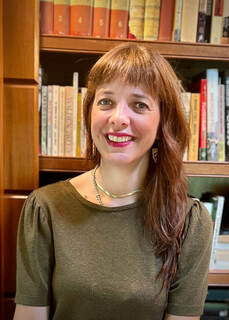
Scholarly Bio: hephzibah v. strmic-pawl holds a Ph.D. in sociology from the University of Virginia, an MA in Social Science from University of Chicago, and a BS in Economics from UW-Madison. An associate professor of sociology at Manhattanville College in New York, she studies race, the racial hierarchy, and racial identity. She is the author of Understanding Racism: Theories of Oppression and Discrimination and Multiracialism and Its Discontents: A Comparative Analysis of Asian-White and Black-White Multiracials. She is also the founding pedagogy editor of the journal, Sociology of Race and Ethnicity.
Reflexive Statement: I had a circuitous route to the world of academia. I attended four community colleges in three different states before ever attending a four-year college, and along the way I certainly never envisioned myself in graduate school, much less as a professor. This pathway provided me with both a deep appreciation for the opportunities that higher education offers and insight into the barriers and hurdles that academia erects. I also have been involved with various resistance efforts over the years including working as a student organizer, opening a non-profit to help community college students navigate the transition to a college/university, advocating for more resources and policies on sexual harassment and violence, creating anti-racist research, writing, and pedagogy, and developing the campaign to create a holiday in honor of Ella Baker. I also have been lucky to have been mentored by multiple scholar-activists throughout the years, including folx at AHS who supported me in my own activist development.
I take my position as Editor of Humanity & Society with great seriousness and recognize the responsibility and opportunity it offers to support and publish critical scholarship. With the support of an amazing editorial board and dedicated AHS membership, I hope to broaden and amplify the journal’s reach and emphasize our specialization in inter/cross disciplinary, humanist, social justice work. I aim for Humanity & Society to be a valuable resource for humanist scholar-activists to pursue their agendas and a tool to help AHS expand and have a larger voice in the discourse and movement against oppression.
Should you have any questions or concerns, you can reach me at: [email protected]
I hope you will take a moment to read the bios of our entire Editorial Board below.
Reflexive Statement: I had a circuitous route to the world of academia. I attended four community colleges in three different states before ever attending a four-year college, and along the way I certainly never envisioned myself in graduate school, much less as a professor. This pathway provided me with both a deep appreciation for the opportunities that higher education offers and insight into the barriers and hurdles that academia erects. I also have been involved with various resistance efforts over the years including working as a student organizer, opening a non-profit to help community college students navigate the transition to a college/university, advocating for more resources and policies on sexual harassment and violence, creating anti-racist research, writing, and pedagogy, and developing the campaign to create a holiday in honor of Ella Baker. I also have been lucky to have been mentored by multiple scholar-activists throughout the years, including folx at AHS who supported me in my own activist development.
I take my position as Editor of Humanity & Society with great seriousness and recognize the responsibility and opportunity it offers to support and publish critical scholarship. With the support of an amazing editorial board and dedicated AHS membership, I hope to broaden and amplify the journal’s reach and emphasize our specialization in inter/cross disciplinary, humanist, social justice work. I aim for Humanity & Society to be a valuable resource for humanist scholar-activists to pursue their agendas and a tool to help AHS expand and have a larger voice in the discourse and movement against oppression.
Should you have any questions or concerns, you can reach me at: [email protected]
I hope you will take a moment to read the bios of our entire Editorial Board below.
MANAGING EDITOR
Heidi Nicholls
Heidi Nicholls
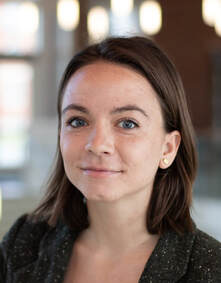
Scholarly Bio: Heidi Nicholls (she/her) is a Ph.D. candidate in sociology at the University of Virginia. She studies race, settler colonialism, state politics, and U.S. empire. She is currently working on a project that compares how settler colonists employed notions of whiteness at various periods of imperial expansion and Indigenous dispossession in Virginia and Hawai‘i. Her previous research analyzes the cultural contestations between the U.S. empire-state and Kanaka Maoli movements for sovereignty in Hawai‘i.
Reflexive Statement: My research and teaching stem from my own experiences as a white settler military kid whose moves were shaped by the demands of U.S. empire. Sociology, at its best, has allowed me to attend to both how we got here and the relationships we can take care of that allow us to think and live beyond the empire-state. As the managing editor for Humanity and Society, I look forward to contributing to a generative intellectual community in whatever ways I can.
Reflexive Statement: My research and teaching stem from my own experiences as a white settler military kid whose moves were shaped by the demands of U.S. empire. Sociology, at its best, has allowed me to attend to both how we got here and the relationships we can take care of that allow us to think and live beyond the empire-state. As the managing editor for Humanity and Society, I look forward to contributing to a generative intellectual community in whatever ways I can.
BOOK & MEDIA REVIEW EDITORS:
Shaonta' Allen & Maretta McDonald
Shaonta' Allen & Maretta McDonald
Shaonta' Allen
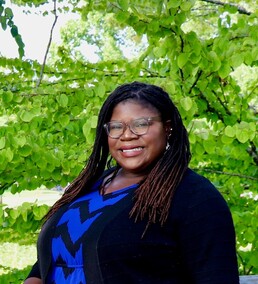
Scholarly Bio: Shaonta’ Allen holds a B.A in Sociology & American Ethnic Studies from the University of Washington, an M.A. in Sociology and Graduate Certificate in Women & Gender Studies from Middle Tennessee State University, and a Ph.D. in Sociology from the University of Cincinnati. Currently a Mellon Faculty Fellow at Dartmouth College in the Department of Sociology and in affiliation with the Department of African & African American Studies, her research examines how Black individuals and groups perceive and respond to social inequality and how this resistance varies across social institutions. She specifically explores Black resistive practices within Religion, Higher Education, and Pop-Culture & Sport to theorize contemporary strategies for navigating racial and gendered hierarchies. Believing in the radical potential of sociology, Dr. Shay teaches and produces research with the goal of facilitating social change.
Reflexive Statement: My love for reading and learning led me to the discipline of Sociology. As a child, I was known for asking lots of questions, a habit and skill that has stuck with me through adulthood. Once formally exposed to the field as an undergraduate, I quickly realized that through Sociology, I can make a career out of asking questions about things that intrigued me as a Black woman in America and seeking their answers with reading and research. Throughout my scholarly training, my thinking has been shaped by my community, my faith, and by transdisciplinary frameworks like Black Feminist Thought and Black Oppositional Consciousness. These approaches anchor my sociological imagination, and compel me to read, research, and write about the powerful role resistance plays in dictating how we are situated within, and move throughout, the matrix of domination undergirding our social world. Reading via the consumption of both print and digital media is powerful and not just for research or publishing purposes, but also as a means towards leisure, pleasure, and transformation as well. In this moment where BookTube, BookstaGram, and BookTok are notable socially-networked communities, it is an opportune time to contribute to ongoing conversations about the print and digital media aimed at reflecting and making sense of our social lives. For this reason, I am excited about this opportunity to assume the role of Book & Media Editor alongside, my dynamic colleague and co-author, Dr. Maretta McDonald. In this role, we intend to curate a collection of reviews from scholars, activists, and community-practitioners about books and/or media, both academic and public-facing, that highlight social issues and promote social change, that detail oppression while inspiring resistance, and that entertain while mobilizing. The Association of Humanist Sociologists contends that we, as individuals, are not just products of social forces, but also are shapers of social life. It is my hope that the Book & Media Review section of Humanity and Society will further demonstrate this social fact.
Reflexive Statement: My love for reading and learning led me to the discipline of Sociology. As a child, I was known for asking lots of questions, a habit and skill that has stuck with me through adulthood. Once formally exposed to the field as an undergraduate, I quickly realized that through Sociology, I can make a career out of asking questions about things that intrigued me as a Black woman in America and seeking their answers with reading and research. Throughout my scholarly training, my thinking has been shaped by my community, my faith, and by transdisciplinary frameworks like Black Feminist Thought and Black Oppositional Consciousness. These approaches anchor my sociological imagination, and compel me to read, research, and write about the powerful role resistance plays in dictating how we are situated within, and move throughout, the matrix of domination undergirding our social world. Reading via the consumption of both print and digital media is powerful and not just for research or publishing purposes, but also as a means towards leisure, pleasure, and transformation as well. In this moment where BookTube, BookstaGram, and BookTok are notable socially-networked communities, it is an opportune time to contribute to ongoing conversations about the print and digital media aimed at reflecting and making sense of our social lives. For this reason, I am excited about this opportunity to assume the role of Book & Media Editor alongside, my dynamic colleague and co-author, Dr. Maretta McDonald. In this role, we intend to curate a collection of reviews from scholars, activists, and community-practitioners about books and/or media, both academic and public-facing, that highlight social issues and promote social change, that detail oppression while inspiring resistance, and that entertain while mobilizing. The Association of Humanist Sociologists contends that we, as individuals, are not just products of social forces, but also are shapers of social life. It is my hope that the Book & Media Review section of Humanity and Society will further demonstrate this social fact.
Maretta McDonald
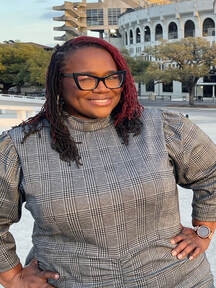
Scholarly Bio: Maretta McDonald is a 2022 -2023 National Poverty Fellow with the Institute for Research on Poverty located at the University of Wisconsin-Madison. She will join the Sociology Department at Virginia Tech as an Assistant Professor Fall 2023. She earned her PhD in Sociology from Louisiana State University. A 2021-2022 American Sociological Association Minority Fellow and 2016 -2020 Southern Regional Education Board Doctoral Fellow, her research interests are racial inequality, gender, family, criminology, and public policy. Dr. McDonald’s current research examines the relationship between state institutions’ policies and practices and social inequality across urban and rural contexts. Her research has been supported by the American Sociological Association Doctoral Dissertation Research Improvement Grant and the LSU Graduate School Dissertation Year Grant. Dr. McDonald focuses her research and teaching on bridging the divide between academia and the public. To that end, she is a coauthor of the forthcoming academic book, The Sociology of Cardi B, under contract with Routledge scheduled for release in 2022.
Reflexive Statement: My mother taught me that we all have a responsibility to help others. Whether it's interpersonally or more globally, we are our best selves when we seek to support each other in happy times and in times that are challenging. Growing up in a poor neighborhood on the West side of Chicago, I learned about community support. My mom and her neighbors borrowed more than sugar from each other. Meat, money, and mothering were among the things exchanged in our building. My adolescence in Oakland, California taught me about collective action. The culture of Oakland, home of the Black Panthers, breeds a sense of resistance and social justice. I became involved in protests and social change campaigns in high school and I continue to do so. This belief, that we are here to serve humanity, shapes my personal life and professional life. I started my academic journey in hopes of helping low income Black fathers navigate their issues with child support courts at the individual level. However, I discovered sociology and criminology realizing that I could help in a more global way by doing research that speaks to public policy. I also help others using my passion for motivating and supporting young adults in academic spaces, where I now mentor students. Lastly, I use my research skills to assist community organizations in their efforts to empower local communities. I have been a member of AHS since 2016 and it has been one of only a few spaces where I find others who believe that we have a responsibility to help others. I am excited to be able to serve the AHS in this capacity alongside Dr. Allen to bring to light new knowledge that helps further our mission to help others by advocating for social justice.
PEDAGOGY EDITOR, Myron Strong
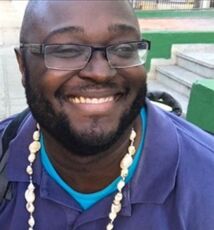
Scholarly Bio: Myron T. Strong is an award-winning sociologist, who is currently an Associate Professor of Sociology at the Community College of Baltimore County in Baltimore, Maryland. He graduated with his Ph.D. in sociology from the University of North Texas in 2014. His research explores Afrofuturism, race, gender and other social factors in modern comics and popular culture. In 2019, he won the Eastern Sociological Society Barbara R. Walters Community College Faculty Award for his article “The Emperor Has New Clothes: How Outsider Sociology Can Shift the Discipline” published in Sociological Forum. He also won the Innovation of the Year for the Community College of Baltimore County for his co-authored book Sociology in Stories: A Creative Introduction to a Fascinating Perspective: a Customized Version for The Community College of Baltimore County, which uses multiple lenses to frame the sociological stories that make up each chapter. He recently published book chapters; The first examines the construction in modern reality television shows in Race in American Television: Voices and Visions that Shaped a Nation. Working on 3 article project on Afrofuturism and Black Panther. The first was published in the journal Contexts Afrofuturism and Black Panther. The second was recently published and explores the way the Dora Milaje represent a continuation of these traditions and show how Pan Africanism and collective memory is important to not only understanding Black identity. It is in Afrofuturism and Black Panther: Gender Identity and Re-Making of Blackness. Currently, developing two book projects and has forth coming scholarship on comics and first generation students.
Reflexive Statement: As I write this statement, I think of Toni Morrison’s remarks on how a pursuit of higher education is a pursuit of freedom that once obtain should be paid forward. “I tell my students,” said Morrison, “When you get these jobs that you have been so brilliantly trained for, just remember that your real job is that if you are free, you need to free somebody else. If you have some power, then your job is to empower somebody else. This is not just a grab-bag candy game.” This statement has always resonated with me. It is indeed our responsibility and as a part of the Humanity and Society editorial board , I promise to continue to help, empower, support and pull up graduate students, faculty, colleagues and whoever is in need.
Reflexive Statement: As I write this statement, I think of Toni Morrison’s remarks on how a pursuit of higher education is a pursuit of freedom that once obtain should be paid forward. “I tell my students,” said Morrison, “When you get these jobs that you have been so brilliantly trained for, just remember that your real job is that if you are free, you need to free somebody else. If you have some power, then your job is to empower somebody else. This is not just a grab-bag candy game.” This statement has always resonated with me. It is indeed our responsibility and as a part of the Humanity and Society editorial board , I promise to continue to help, empower, support and pull up graduate students, faculty, colleagues and whoever is in need.
SOCIAL MEDIA EDITOR, Emily McDonald
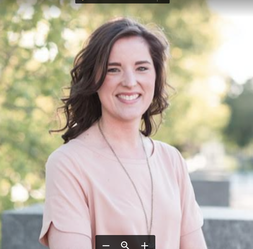
Scholarly Bio: Emily McDonald joined the Humanity and Society board in 2021. She completed her PhD in Public Sociology at George Mason University, where her academic work focused on the policy history of the philanthropic sector in the U.S. During her time there, she taught undergraduate sociology and interdisciplinary courses, worked as a research assistant for a Community Conversations project, and became an active member of an international participatory action research (PAR) scholars' community that supports one another to build the capacity of their communities to engage in PAR. Professionally beyond academia, Emily worked alongside and developed tools for cultural organizations to build their capacity to conduct impact evaluations, where she found a passion for participatory and community-based research models and understanding the role of culture and history in fostering civic engagement. She has been an active member of AHS since 2015. Her hobbies include learning how to cook any recipes developed in her home state of Louisiana and long bike rides.
Reflexive Statement: As an applied scholar who has always split time inside and outside academia, I believe in creating work that is fundamentally rooted in a public good. I come to Humanity and Society as a space that can foster dialogue that does not assume any one institution, profession, or qualification is the legitimate producer of knowledge, but that knowledge is produced through community and critical reflection.
Reflexive Statement: As an applied scholar who has always split time inside and outside academia, I believe in creating work that is fundamentally rooted in a public good. I come to Humanity and Society as a space that can foster dialogue that does not assume any one institution, profession, or qualification is the legitimate producer of knowledge, but that knowledge is produced through community and critical reflection.
DEPUTY EDITORS
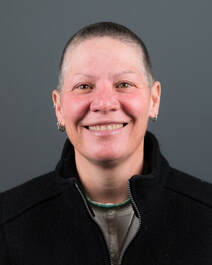
Emma G. Bailey
Scholarly Bio: Emma G Bailey holds a PhD in Religion and Social Change from the University of Denver. Currently Emma is a visiting professor in the Center for Gender Studies at the Universidad Veracruzana in Xalapa, Mexico where she teaches in the applied masters of gender studies program. Emma was professor of sociology at Western New Mexico University from 2004-2019. Currently her research focuses on Gay Tourism and queer consciousness. She is the author of We Are Hope: Women Living Beyond the Violence in Ciudad Juárez.
Reflexive Statement: At base, I am driven by the pursuit of social justice. I believe that we cannot understand the roots of injustice without research. One way that we can begin the road to justice is through engaged teaching based on critical research. Hence I identify much more as a teacher/activist/scholar. In this role I believe it is crucial that I am clear about my desire for social justice and that I bring my whole self to the process. For me, this involves being as self-reflexive as possible in which I account for my own privilege and my own perspective while listening and learning from both community and students.
Website: https://bikesandotherbailiwicks.wordpress.com
Scholarly Bio: Emma G Bailey holds a PhD in Religion and Social Change from the University of Denver. Currently Emma is a visiting professor in the Center for Gender Studies at the Universidad Veracruzana in Xalapa, Mexico where she teaches in the applied masters of gender studies program. Emma was professor of sociology at Western New Mexico University from 2004-2019. Currently her research focuses on Gay Tourism and queer consciousness. She is the author of We Are Hope: Women Living Beyond the Violence in Ciudad Juárez.
Reflexive Statement: At base, I am driven by the pursuit of social justice. I believe that we cannot understand the roots of injustice without research. One way that we can begin the road to justice is through engaged teaching based on critical research. Hence I identify much more as a teacher/activist/scholar. In this role I believe it is crucial that I am clear about my desire for social justice and that I bring my whole self to the process. For me, this involves being as self-reflexive as possible in which I account for my own privilege and my own perspective while listening and learning from both community and students.
Website: https://bikesandotherbailiwicks.wordpress.com
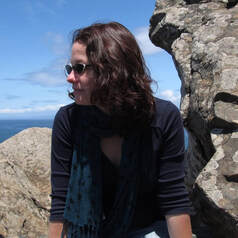
Emily Brissette
Scholarly Bio: Emily Brissette has a PhD in Sociology from the University of California, Berkeley and is an Assistant Professor of Criminal Justice at Bridgewater State University. Her work traverses the fields of social movement studies, critical criminology, and political theory, broadly defined. It explores the dialectical relationship between state power and struggles for social justice, with a focus on violence, subjectivities, and prefigurative politics. Her work has appeared in several venues, including Social Movement Studies, Social Justice, and Theoretical Criminology. One of her favorite pieces, “Beyond Tear Gas and Torched Dumpsters: Rethinking Violence at Occupy Oakland,” was published in Humanity & Society.
Reflexive Statement: I came to sociology as an undergraduate in the late 1990s with an interest in human rights, law, and global justice, but found myself educated as much in political meetings and street protests as I was in the classroom. I had wonderful professors, in undergrad and graduate school, who introduced me to the Marxist, Black feminist, and poststructuralist theories that have profoundly shaped my thinking. But my mentors have also included principled and dedicated comrades in the various political collectives and movement spaces I have been a part of over the years, who have combined rigorous analyses of the world as it is with efforts to expand imaginative horizons and effect radical transformation. I joined AHS in 2013, deeply appreciative to find in humanist sociology a recognition and affirmation of the organic knowledge production that takes place in social movements and more quotidian community spaces. I am excited to join the editorial board of Humanity & Society to help further amplify the work of scholars, activists, and others struggling to reimagine and transform the world.
Scholarly Bio: Emily Brissette has a PhD in Sociology from the University of California, Berkeley and is an Assistant Professor of Criminal Justice at Bridgewater State University. Her work traverses the fields of social movement studies, critical criminology, and political theory, broadly defined. It explores the dialectical relationship between state power and struggles for social justice, with a focus on violence, subjectivities, and prefigurative politics. Her work has appeared in several venues, including Social Movement Studies, Social Justice, and Theoretical Criminology. One of her favorite pieces, “Beyond Tear Gas and Torched Dumpsters: Rethinking Violence at Occupy Oakland,” was published in Humanity & Society.
Reflexive Statement: I came to sociology as an undergraduate in the late 1990s with an interest in human rights, law, and global justice, but found myself educated as much in political meetings and street protests as I was in the classroom. I had wonderful professors, in undergrad and graduate school, who introduced me to the Marxist, Black feminist, and poststructuralist theories that have profoundly shaped my thinking. But my mentors have also included principled and dedicated comrades in the various political collectives and movement spaces I have been a part of over the years, who have combined rigorous analyses of the world as it is with efforts to expand imaginative horizons and effect radical transformation. I joined AHS in 2013, deeply appreciative to find in humanist sociology a recognition and affirmation of the organic knowledge production that takes place in social movements and more quotidian community spaces. I am excited to join the editorial board of Humanity & Society to help further amplify the work of scholars, activists, and others struggling to reimagine and transform the world.
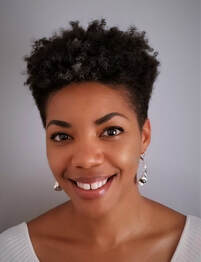
Nnenia Campbell
Scholarly Bio: Nnenia Campbell is Deputy Director at the Bill Anderson Fund and a Research Associate with the Natural Hazards Center at the University of Colorado Boulder. Dr. Campbell’s work with the Bill Anderson Fund supports leadership, professional development, and research training among historically underrepresented minority doctoral students studying hazards and disasters. Her scholarly work translates empirical research on the social aspects of disasters into tools and information products designed for practitioners and decision-makers, with an emphasis on inclusive engagement.
Reflexive Statement: I am an applied sociologist who is passionate about doing research that serves the needs of communities and community-based organizations. As a disaster researcher and program evaluator, my work examines the social dynamics and systems that contribute to environmental risk in marginalized communities and the ways in which these groups express agency and resilience in the face of those risks. I care deeply about doing work that prioritizes reciprocity, collaboration, and respect for those who share their insights about environmental hazards and traumatic losses.
Scholarly Bio: Nnenia Campbell is Deputy Director at the Bill Anderson Fund and a Research Associate with the Natural Hazards Center at the University of Colorado Boulder. Dr. Campbell’s work with the Bill Anderson Fund supports leadership, professional development, and research training among historically underrepresented minority doctoral students studying hazards and disasters. Her scholarly work translates empirical research on the social aspects of disasters into tools and information products designed for practitioners and decision-makers, with an emphasis on inclusive engagement.
Reflexive Statement: I am an applied sociologist who is passionate about doing research that serves the needs of communities and community-based organizations. As a disaster researcher and program evaluator, my work examines the social dynamics and systems that contribute to environmental risk in marginalized communities and the ways in which these groups express agency and resilience in the face of those risks. I care deeply about doing work that prioritizes reciprocity, collaboration, and respect for those who share their insights about environmental hazards and traumatic losses.
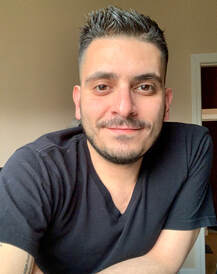
Ghassan Moussawi
Scholarly Bio: Ghassan Moussawi holds a PhD in Sociology from Rutgers University, an MA in Sociology from Rutgers University and an MA in Sociology from the American University of Beirut, and a BA in Anthropology & Sociology from the American University of Beirut. He is currently Associate Professor of Gender and Women's Studies and Sociology at the University of Illinois- Urbana Champaign, with an affiliate appointment in the Unit for Criticism and Interpretive Theory. His research and teaching lies at the intersections of transnational gender and sexuality studies, everyday life precarity and violence, queer theory, affect studies, race and ethnicity, and queer of color critique- with keen attention to nation and empire. His book Disruptive Situations: Fractal Orientalism and Queer Strategies (Temple University Press, 2020), examines queer strategies of survival amidst everyday life violence and disruptions. His work has appeared in Gender, Place, and Culture, Sexualities, The Sociological Review, Sociological Forum, Departures in Critical Qualitative Research and the International Journal of Urban and Regional Research.
Reflexive Statement: I am thrilled to be part of the editorial board of Humanity and Society. As a humanistic sociologist who works from an interdisciplinary perspective, I am excited to be part of a collective that pushes the boundaries of sociological knowledge and takes interdisplinarity seriously. As part of the board, I would like to highlight interdisciplinary sociological works that use queer theory, queer of color critique, affect, and auto-ethnography. As a humanistic feminist sociologist, I have benefited and learned so much from the power of using interdisplinarity. My work relies on the intersections of multiple feminisms including women of color feminisms, postcolonial and transnational feminisms, Indigenous feminisms, and knowledge production from the Global South. I hope that the journal will gain more global and international reach, given the cutting-edge work that is published.
Scholarly Bio: Ghassan Moussawi holds a PhD in Sociology from Rutgers University, an MA in Sociology from Rutgers University and an MA in Sociology from the American University of Beirut, and a BA in Anthropology & Sociology from the American University of Beirut. He is currently Associate Professor of Gender and Women's Studies and Sociology at the University of Illinois- Urbana Champaign, with an affiliate appointment in the Unit for Criticism and Interpretive Theory. His research and teaching lies at the intersections of transnational gender and sexuality studies, everyday life precarity and violence, queer theory, affect studies, race and ethnicity, and queer of color critique- with keen attention to nation and empire. His book Disruptive Situations: Fractal Orientalism and Queer Strategies (Temple University Press, 2020), examines queer strategies of survival amidst everyday life violence and disruptions. His work has appeared in Gender, Place, and Culture, Sexualities, The Sociological Review, Sociological Forum, Departures in Critical Qualitative Research and the International Journal of Urban and Regional Research.
Reflexive Statement: I am thrilled to be part of the editorial board of Humanity and Society. As a humanistic sociologist who works from an interdisciplinary perspective, I am excited to be part of a collective that pushes the boundaries of sociological knowledge and takes interdisplinarity seriously. As part of the board, I would like to highlight interdisciplinary sociological works that use queer theory, queer of color critique, affect, and auto-ethnography. As a humanistic feminist sociologist, I have benefited and learned so much from the power of using interdisplinarity. My work relies on the intersections of multiple feminisms including women of color feminisms, postcolonial and transnational feminisms, Indigenous feminisms, and knowledge production from the Global South. I hope that the journal will gain more global and international reach, given the cutting-edge work that is published.
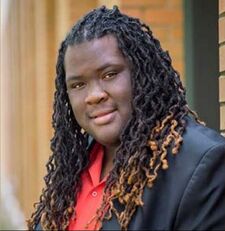
Jason Williams
Scholarly Bio: Dr. Jason Williams is an Associate Professor of Justice Studies at Montclair State University. He’s a passionate activist criminologist deeply concerned about racial and gender disparity and mistreatment within the criminal legal system. He’s published various articles on returning citizens and incarceration, policing and race, gender, and social control, and the broader implications around racialized social control. He is a qualitative criminologist who engages in community-grounded approaches to research. His perspectives and research has been quoted by media outlets around the nation.
Reflexive Statement: Growing up in a housing project complex forced me to learn the world's way early. My friends and I often talked about being forced to navigate poverty and other structural/racial inequalities as youth. While we did not have the exquisite vocabulary of the academy to explain our thoughts, we always knew something about our reality was unjust. Witnessing various malpractices in the administration of justice forced me to develop an appreciation for studying social control. My earlier forms of community engagement started while I was a preteen, helping with tenant council meetings and the community affairs coordinator for my local housing authority office. My lived experiences would later drive me to major in criminal justice, which helped me further understand the context I lived. This track would also allow me to build a better comprehension of theory and its utility in research. I began combining theory with practice in ways that turned me into an asset for community engagement. I was honored to have had excellent mentors throughout my journey who taught me that lived experiences matter in research, especially for marginalized voices. I came to academia as a writer. As a youth, I loved writing stories, scripts, etc. Thus, my approach to academic research is similar. I bask in the importance of elevating suppressed voices and ushering paradigmatic onto-epistemological changes. I am led by various radical traditions, such as Black Radical Tradition, Black Feminisms, Critical Criminology, and Critical Race Theory. I aim to serve Humanity & Society in ways that allow my expertise to be a resource for a journal that I believe to be immensely important during these tumultuous times.
Scholarly Bio: Dr. Jason Williams is an Associate Professor of Justice Studies at Montclair State University. He’s a passionate activist criminologist deeply concerned about racial and gender disparity and mistreatment within the criminal legal system. He’s published various articles on returning citizens and incarceration, policing and race, gender, and social control, and the broader implications around racialized social control. He is a qualitative criminologist who engages in community-grounded approaches to research. His perspectives and research has been quoted by media outlets around the nation.
Reflexive Statement: Growing up in a housing project complex forced me to learn the world's way early. My friends and I often talked about being forced to navigate poverty and other structural/racial inequalities as youth. While we did not have the exquisite vocabulary of the academy to explain our thoughts, we always knew something about our reality was unjust. Witnessing various malpractices in the administration of justice forced me to develop an appreciation for studying social control. My earlier forms of community engagement started while I was a preteen, helping with tenant council meetings and the community affairs coordinator for my local housing authority office. My lived experiences would later drive me to major in criminal justice, which helped me further understand the context I lived. This track would also allow me to build a better comprehension of theory and its utility in research. I began combining theory with practice in ways that turned me into an asset for community engagement. I was honored to have had excellent mentors throughout my journey who taught me that lived experiences matter in research, especially for marginalized voices. I came to academia as a writer. As a youth, I loved writing stories, scripts, etc. Thus, my approach to academic research is similar. I bask in the importance of elevating suppressed voices and ushering paradigmatic onto-epistemological changes. I am led by various radical traditions, such as Black Radical Tradition, Black Feminisms, Critical Criminology, and Critical Race Theory. I aim to serve Humanity & Society in ways that allow my expertise to be a resource for a journal that I believe to be immensely important during these tumultuous times.
ASSOCIATE EDITORS
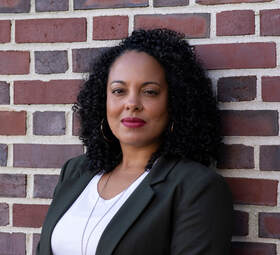
Brittany Battle
Scholarly Bio: Dr. Brittany Pearl Battle is an Assistant Professor in the Sociology Department and Affiliate Faculty in the African American Studies Program at Wake Forest University and a Fellow with the Institute for Research on Poverty’s Emerging Poverty Scholars Program. She is also the co-founder of Triad Abolition Project, a grassroots organization based in Winston-Salem, NC, working to dismantle the carceral state. Her research agenda includes social and family policy, courts, social justice, and carceral logics. She teaches courses on social justice, abolition and transformative justice, and courts and criminal procedure. She is currently working on a book manuscript (under contract with NYU Press),“They’re Stealing My Opportunity to Be a Father:” The Child Support System and State Intervention in the Family, which examines the carceral logics of the state’s intervention in the family in this system. She is also currently working on a project examining the perspectives of abolitionist activists and organizers who were involved in the 2020 uprising, a project examining evictions in Forsyth County, NC during the Covid19 pandemic, and a project exploring the experiences of criminal legal system defendants and asylum seekers under various forms of state surveillance and community confinement. Her community work regularly includes political education, such as workshops and teach-ins, and direct actions, including marches and letter writing events in support of incarcerated people. Her praxis of scholarship and activism has been recognized with the 2022 Eastern Sociological Society’s Public Sociology Award, 2021 Sociologists for Women in Society’s Feminist Activism Award, and the 2020 Praxis Award from the American Society of Criminology’s Division on Critical Criminology and Social Justice. Her work has been funded by the Ford Foundation and American Sociological Association’s Minority Fellowship Program.
Reflexive Statement: I entered academia for my community and believe that knowledge should be produced for social transformation. My scholarship is grounded in the practice and promise of abolition which requires that we dream together about how to create a more just world with less suffering. I try to use my work to honor the traditions of Black radical feminists both inside and outside the academy who have engaged in the collective struggle of knowledge production to help guide our research, teaching, community work, and dreams toward our liberatory agenda.
Scholarly Bio: Dr. Brittany Pearl Battle is an Assistant Professor in the Sociology Department and Affiliate Faculty in the African American Studies Program at Wake Forest University and a Fellow with the Institute for Research on Poverty’s Emerging Poverty Scholars Program. She is also the co-founder of Triad Abolition Project, a grassroots organization based in Winston-Salem, NC, working to dismantle the carceral state. Her research agenda includes social and family policy, courts, social justice, and carceral logics. She teaches courses on social justice, abolition and transformative justice, and courts and criminal procedure. She is currently working on a book manuscript (under contract with NYU Press),“They’re Stealing My Opportunity to Be a Father:” The Child Support System and State Intervention in the Family, which examines the carceral logics of the state’s intervention in the family in this system. She is also currently working on a project examining the perspectives of abolitionist activists and organizers who were involved in the 2020 uprising, a project examining evictions in Forsyth County, NC during the Covid19 pandemic, and a project exploring the experiences of criminal legal system defendants and asylum seekers under various forms of state surveillance and community confinement. Her community work regularly includes political education, such as workshops and teach-ins, and direct actions, including marches and letter writing events in support of incarcerated people. Her praxis of scholarship and activism has been recognized with the 2022 Eastern Sociological Society’s Public Sociology Award, 2021 Sociologists for Women in Society’s Feminist Activism Award, and the 2020 Praxis Award from the American Society of Criminology’s Division on Critical Criminology and Social Justice. Her work has been funded by the Ford Foundation and American Sociological Association’s Minority Fellowship Program.
Reflexive Statement: I entered academia for my community and believe that knowledge should be produced for social transformation. My scholarship is grounded in the practice and promise of abolition which requires that we dream together about how to create a more just world with less suffering. I try to use my work to honor the traditions of Black radical feminists both inside and outside the academy who have engaged in the collective struggle of knowledge production to help guide our research, teaching, community work, and dreams toward our liberatory agenda.
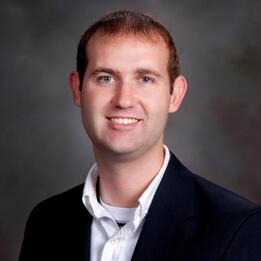
Carson Byrd
Scholarly Bio: W. Carson Byrd is currently a Senior Fellow-in-Residence in the National Center for Institutional Diversity at the University of Michigan, and a William T. Grant Advanced Quantitative and Computational Scholar in the Institute in Critical Quantitative, Computational, and Mixed Methodologies. His research uncovers and links the manifestations of racialization within educational environments to broader patterns of social inequalities in society by elaborating how educational institutions, especially colleges and universities, can simultaneously amplify and reduce inequalities. The complicated relationship between education and racial inequality has led him to explore the racialized experiences of college students including the associations of inter- and intraracial interactions with students’ identities and racial ideologies, and their navigation of different degree pathways that often result in disparate academic and social outcomes. His work also explores the racialization of science and knowledge production, including discussions of genetics, genomics, and inequality, that can influence what students learn in STEM classrooms, what they view as a viable career path, and why inequalities exist on-campus and in their communities. He holds a PhD and MS in Sociology from Virginia Tech, and a BA in Sociology from Mars Hill College.
Reflexive Statement: While higher education is often situated as places and spaces for learning and growth, we often fall short of doing so as a community and working with communities beyond our campuses. I attempt to use my work to deepen conversations and analyses of society such that what we do in sociology, and academia more broadly, is better at embracing and uplifting humanity rather than continuing the marginalization and oppression of the past and present. AHS and Humanity & Society provide a venue for cultivating such conversations and research that can further the goals of being better scholars and community members.
Scholarly Bio: W. Carson Byrd is currently a Senior Fellow-in-Residence in the National Center for Institutional Diversity at the University of Michigan, and a William T. Grant Advanced Quantitative and Computational Scholar in the Institute in Critical Quantitative, Computational, and Mixed Methodologies. His research uncovers and links the manifestations of racialization within educational environments to broader patterns of social inequalities in society by elaborating how educational institutions, especially colleges and universities, can simultaneously amplify and reduce inequalities. The complicated relationship between education and racial inequality has led him to explore the racialized experiences of college students including the associations of inter- and intraracial interactions with students’ identities and racial ideologies, and their navigation of different degree pathways that often result in disparate academic and social outcomes. His work also explores the racialization of science and knowledge production, including discussions of genetics, genomics, and inequality, that can influence what students learn in STEM classrooms, what they view as a viable career path, and why inequalities exist on-campus and in their communities. He holds a PhD and MS in Sociology from Virginia Tech, and a BA in Sociology from Mars Hill College.
Reflexive Statement: While higher education is often situated as places and spaces for learning and growth, we often fall short of doing so as a community and working with communities beyond our campuses. I attempt to use my work to deepen conversations and analyses of society such that what we do in sociology, and academia more broadly, is better at embracing and uplifting humanity rather than continuing the marginalization and oppression of the past and present. AHS and Humanity & Society provide a venue for cultivating such conversations and research that can further the goals of being better scholars and community members.
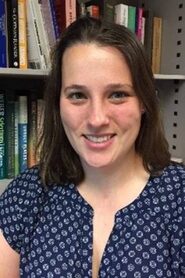
Kaitland Byrd
Scholarly Bio: Kaitland M. Byrd holds a Ph.D. in sociology from Virginia Tech and a B.S. from Bridgewater College. She is currently a researcher for Michigan Medicine at the University of Michigan. She is the author of Real Southern Barbecue and Southern Craft Food Diversity. Her work centers on southern food culture, inequality, and medical education.
Reflexive Statement: As a sociologist, now in an applied position, I believe in creating work that focuses on social equity. I come to AHS as a place with a strong sense of community, research, and service that is grounded in social justice.
Scholarly Bio: Kaitland M. Byrd holds a Ph.D. in sociology from Virginia Tech and a B.S. from Bridgewater College. She is currently a researcher for Michigan Medicine at the University of Michigan. She is the author of Real Southern Barbecue and Southern Craft Food Diversity. Her work centers on southern food culture, inequality, and medical education.
Reflexive Statement: As a sociologist, now in an applied position, I believe in creating work that focuses on social equity. I come to AHS as a place with a strong sense of community, research, and service that is grounded in social justice.
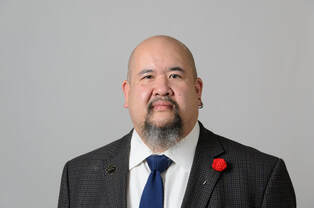
David Embrick
Scholarly Bio: Dr. David G. Embrick is an Associate Professor with a joint position in Africana Studies Institute and the Department of Sociology, and affiliate faculty at the Office of Diversity and Inclusion at UConn. He is also the Director of Research for Resilient Cities, Racism, and Equity at UConn Hartford.
Reflexive Statement: I have spent the greater part of my academic career challenging the elitist, racist, and other inequities that in many ways serve as a foundation of higher education. This is especially true of our discipline and professional organizations. AHS, while note perfect, has provided space to engage in the still important question posed by founders Betty and Alfred McClung Lee, "...sociology for whom?"
Scholarly Bio: Dr. David G. Embrick is an Associate Professor with a joint position in Africana Studies Institute and the Department of Sociology, and affiliate faculty at the Office of Diversity and Inclusion at UConn. He is also the Director of Research for Resilient Cities, Racism, and Equity at UConn Hartford.
Reflexive Statement: I have spent the greater part of my academic career challenging the elitist, racist, and other inequities that in many ways serve as a foundation of higher education. This is especially true of our discipline and professional organizations. AHS, while note perfect, has provided space to engage in the still important question posed by founders Betty and Alfred McClung Lee, "...sociology for whom?"
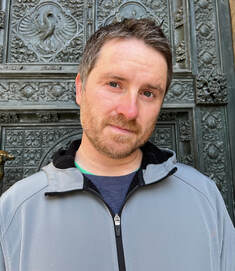
Kasey Henricks
Scholarly Bio: Kasey Henricks holds a PhD from Loyola University Chicago, a BS from Austin Peay State University, and an AAS from Chattanooga State Technical Community College. He is an Assistant Professor of Sociology at the University of Tennessee at Knoxville and an International Fellow at Kulturwissenschaftliches Institut Essen. His work centers how raced and classed inequalities are reproduced over time through local modes of public finance.
Reflexive Statement: I consider AHS as an intellectual home because of the shared sense of community comprised by learners and doers, where members commit themselves to research, teaching, and service that reflects their morals via grounded understandings of social justice.
Scholarly Bio: Kasey Henricks holds a PhD from Loyola University Chicago, a BS from Austin Peay State University, and an AAS from Chattanooga State Technical Community College. He is an Assistant Professor of Sociology at the University of Tennessee at Knoxville and an International Fellow at Kulturwissenschaftliches Institut Essen. His work centers how raced and classed inequalities are reproduced over time through local modes of public finance.
Reflexive Statement: I consider AHS as an intellectual home because of the shared sense of community comprised by learners and doers, where members commit themselves to research, teaching, and service that reflects their morals via grounded understandings of social justice.
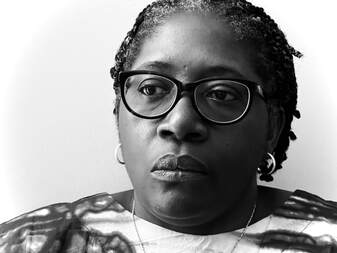
Marie-Claude Jipguep
Scholarly Bio: Marie-Claude Jipguep-Akhtar is a sociologist of race and ethnicity, health, inequality, and social justice. She is an Associate Professor of Sociology at Howard University and the former director of the Graduate Program in the Department of Sociology and Criminology. Her research and teaching interests lie broadly in the areas of race/ethnicity, gender, the life course, and “place” disparities in criminal justice and health. Her scholarship has been published in the Journal of Ethnicity in Substance Abuse, Social Psychology Quarterly, Social Forces, the Journal of Black Psychology, and the Journal of Men's Health. Her most recent publication titled “Risk-Taking Among Older Youth at the Outset of the COVID-19 Pandemic in the USA” can be read in COVID-19 and Childhood Inequality, an edited volume which "unmasks" childhood inequalities through innovative, real-time research on children’s pandemic lives and experiences, situating that research within established child and youth literatures. Her latest work focuses on exploring the intersection of gender with social institutions, namely the criminal justice system and its impact on health behaviors and outcomes, particularly during periods of social upheaval. Dr. Jipguep-Akhtar is currently writing a book entitled “Fifty Keys in Black Social Thought.”
Reflexive Statement: I am humbled and deeply grateful to have been selected to serve as an Associate Editor for Humanity & Society. My research interests align with humanistic sociological approach and stand at the intersection of in race/ethnicity, gender, the life course, and social context or “place” disparities in health for minorities, emerging adults, and criminal justice involved populations. I welcome the opportunity to contribute in a way that honors my and the journal’s commitment to disciplinary diversity and inclusion.
Scholarly Bio: Marie-Claude Jipguep-Akhtar is a sociologist of race and ethnicity, health, inequality, and social justice. She is an Associate Professor of Sociology at Howard University and the former director of the Graduate Program in the Department of Sociology and Criminology. Her research and teaching interests lie broadly in the areas of race/ethnicity, gender, the life course, and “place” disparities in criminal justice and health. Her scholarship has been published in the Journal of Ethnicity in Substance Abuse, Social Psychology Quarterly, Social Forces, the Journal of Black Psychology, and the Journal of Men's Health. Her most recent publication titled “Risk-Taking Among Older Youth at the Outset of the COVID-19 Pandemic in the USA” can be read in COVID-19 and Childhood Inequality, an edited volume which "unmasks" childhood inequalities through innovative, real-time research on children’s pandemic lives and experiences, situating that research within established child and youth literatures. Her latest work focuses on exploring the intersection of gender with social institutions, namely the criminal justice system and its impact on health behaviors and outcomes, particularly during periods of social upheaval. Dr. Jipguep-Akhtar is currently writing a book entitled “Fifty Keys in Black Social Thought.”
Reflexive Statement: I am humbled and deeply grateful to have been selected to serve as an Associate Editor for Humanity & Society. My research interests align with humanistic sociological approach and stand at the intersection of in race/ethnicity, gender, the life course, and social context or “place” disparities in health for minorities, emerging adults, and criminal justice involved populations. I welcome the opportunity to contribute in a way that honors my and the journal’s commitment to disciplinary diversity and inclusion.
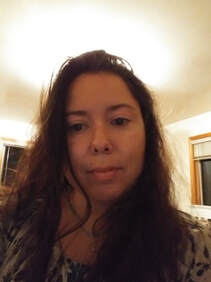
Melissa F. Lavin
Scholarly Bio: Dr. Melissa F. Lavin is an Associate Professor at the State University of New York at Oneonta. She received her B.A. at the the University of Colorado and her Ph.D. from the University of Connecticut. Her areas of specialization include deviance and crime, social psychology, gender and sexuality, work and occupation, and qualitative methods. She serves on the editorial board for the journal Deviant Behavior.
Reflexive Statement: Dr. Melissa F. Lavin is a critical ethnographer and an interactionist sociologist. Her research collaborators have been her co-workers and friends. She is invested in a sociology that explores marginalized practices and advocates for marginalized groups. She strives to create accurate and rich accounts of the life worlds that she studies.
Scholarly Bio: Dr. Melissa F. Lavin is an Associate Professor at the State University of New York at Oneonta. She received her B.A. at the the University of Colorado and her Ph.D. from the University of Connecticut. Her areas of specialization include deviance and crime, social psychology, gender and sexuality, work and occupation, and qualitative methods. She serves on the editorial board for the journal Deviant Behavior.
Reflexive Statement: Dr. Melissa F. Lavin is a critical ethnographer and an interactionist sociologist. Her research collaborators have been her co-workers and friends. She is invested in a sociology that explores marginalized practices and advocates for marginalized groups. She strives to create accurate and rich accounts of the life worlds that she studies.
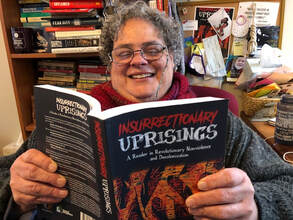
Wende Marshall
Scholarly Bio: Wende Marshall has a PhD from Princeton University, an MA in Religious Studies from Union Theological Seminary, and graduated from Hunter College, CUNY in 1985. She is a low wage flexible gig worker (also known as an adjunct) at Temple University, where she is a member of the Temple Association of University Professional and the Rank-and-File Temple Caucus. Her focus is on organizing and writing that supports the movement for socialism.
Reflexive Statement: Wende Marshall was an activist in southern African liberation support work and anti-apartheid organizing, a tenant organizer in Harlem NYC, a volunteer and board member of the first needle exchange program in Philadelphia, an ethnographer of the decolonization movement in Hawaii, a living wage activist, and a leader/organizer with Stadium Stompers, a North Philadelphia-based campaign of community residents, students and workers who fought to stop Temple University’s proposed football stadium. As an adjunct at Temple, Marshall was a leader in the effort to unionize adjuncts, served as Chair of the Adjunct Constituency Council and Member of the Executive Committee. She was denied tenure at the University of Virginia and has a deep critique of the mediocrity of the academy.
Scholarly Bio: Wende Marshall has a PhD from Princeton University, an MA in Religious Studies from Union Theological Seminary, and graduated from Hunter College, CUNY in 1985. She is a low wage flexible gig worker (also known as an adjunct) at Temple University, where she is a member of the Temple Association of University Professional and the Rank-and-File Temple Caucus. Her focus is on organizing and writing that supports the movement for socialism.
Reflexive Statement: Wende Marshall was an activist in southern African liberation support work and anti-apartheid organizing, a tenant organizer in Harlem NYC, a volunteer and board member of the first needle exchange program in Philadelphia, an ethnographer of the decolonization movement in Hawaii, a living wage activist, and a leader/organizer with Stadium Stompers, a North Philadelphia-based campaign of community residents, students and workers who fought to stop Temple University’s proposed football stadium. As an adjunct at Temple, Marshall was a leader in the effort to unionize adjuncts, served as Chair of the Adjunct Constituency Council and Member of the Executive Committee. She was denied tenure at the University of Virginia and has a deep critique of the mediocrity of the academy.
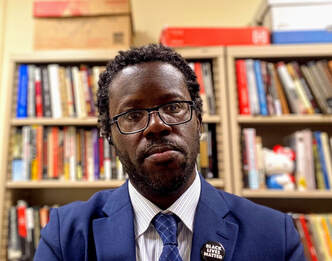
Austin McCoy
Scholarly Bio: Austin McCoy is an Assistant Professor in History at West Virginia University. Austin earned his PhD in History from the University of Michigan in 2016. He served as a Mellon Postdoctoral Fellow in the Michigan-Mellon Project on Egalitarianism and the Metropolis from 2016-2018. His research and teaching interests include African American History, the U.S. Left, labor, and social movements. McCoy is working on a book project tentatively entitled, The Quest for Democracy: Black Power, New Left, and Progressive Politics in the Post-Industrial Midwest, which analyzes campaigns for participatory democracy in economics, foreign policy, and criminal justice after 1967.
Reflexive Statement: Like many scholars, my research and teaching interests stem from my personal circumstances. I grew up in Mansfield, Ohio, a deindustrialized town wrecked by capital abandonment, depopulation, and the manifestations of racial and economic inequalities that have accompanied these trends. My desires to learn how people responded to these conditions historically, as well as engaging in my own anti-racist and anti-war activist work as an undergraduate inspired me to become a historian and shaped my work. I believe my teaching, research, and activist work are mutually constitutive. I learned how radical activists responded to racism, imperialism, capitalism, and sexism by consulting historians’ and activists’ works and I sought to apply the lessons that I learned in my own organizing. Also, I developed my pedagogy, which, depending upon the course, seeks to help students build the capacity for democratic collaboration and decision-making, out of organizing for racial justice as a graduate student at the University of Michigan and organizing against police violence in Ann Arbor.
Scholarly Bio: Austin McCoy is an Assistant Professor in History at West Virginia University. Austin earned his PhD in History from the University of Michigan in 2016. He served as a Mellon Postdoctoral Fellow in the Michigan-Mellon Project on Egalitarianism and the Metropolis from 2016-2018. His research and teaching interests include African American History, the U.S. Left, labor, and social movements. McCoy is working on a book project tentatively entitled, The Quest for Democracy: Black Power, New Left, and Progressive Politics in the Post-Industrial Midwest, which analyzes campaigns for participatory democracy in economics, foreign policy, and criminal justice after 1967.
Reflexive Statement: Like many scholars, my research and teaching interests stem from my personal circumstances. I grew up in Mansfield, Ohio, a deindustrialized town wrecked by capital abandonment, depopulation, and the manifestations of racial and economic inequalities that have accompanied these trends. My desires to learn how people responded to these conditions historically, as well as engaging in my own anti-racist and anti-war activist work as an undergraduate inspired me to become a historian and shaped my work. I believe my teaching, research, and activist work are mutually constitutive. I learned how radical activists responded to racism, imperialism, capitalism, and sexism by consulting historians’ and activists’ works and I sought to apply the lessons that I learned in my own organizing. Also, I developed my pedagogy, which, depending upon the course, seeks to help students build the capacity for democratic collaboration and decision-making, out of organizing for racial justice as a graduate student at the University of Michigan and organizing against police violence in Ann Arbor.
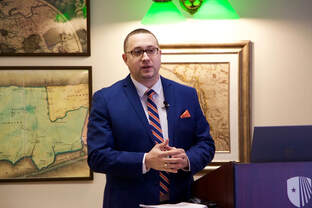
Zebulon Vance Miletsky
Scholarly Bio: Zebulon Vance Miletsky is an Associate Professor of Africana Studies and History at Stony Brook University. He specializes in African American History, History of Miscegenation, Interracial Marriage, Urban History, African Americans in Boston, and Mixed Race and Biracial Identity. Originally from Boston, Miletsky received his Ph.D. in African-American Studies with a concentration in African American History from the University of Massachusetts-Amherst. Having previously served as an Assistant Professor in the Black Studies Department at the University of Nebraska at Omaha, he served as a Post-Doctoral Fellow in African-American Studies in the History Department at Case Western Reserve University in 2010-2011. His teaching and research interests include the Northern Civil Rights Movement, the long Civil Rights struggle, Black Power, the Afro-Latin diaspora and Hip-Hop. In addition, Miletsky is interested in the Boston School Desegregation Crisis and the parent-led Civil Rights Movement in Boston. His articles have appeared in the Trotter Review, The Historical Journal of Massachusetts and the Journal of History. His new book, Before Busing: A History of Boston’s Long Black Freedom Struggle, is being published by the University of North Carolina Press for release in December 2022.
Reflexive Statement: ...
Scholarly Bio: Zebulon Vance Miletsky is an Associate Professor of Africana Studies and History at Stony Brook University. He specializes in African American History, History of Miscegenation, Interracial Marriage, Urban History, African Americans in Boston, and Mixed Race and Biracial Identity. Originally from Boston, Miletsky received his Ph.D. in African-American Studies with a concentration in African American History from the University of Massachusetts-Amherst. Having previously served as an Assistant Professor in the Black Studies Department at the University of Nebraska at Omaha, he served as a Post-Doctoral Fellow in African-American Studies in the History Department at Case Western Reserve University in 2010-2011. His teaching and research interests include the Northern Civil Rights Movement, the long Civil Rights struggle, Black Power, the Afro-Latin diaspora and Hip-Hop. In addition, Miletsky is interested in the Boston School Desegregation Crisis and the parent-led Civil Rights Movement in Boston. His articles have appeared in the Trotter Review, The Historical Journal of Massachusetts and the Journal of History. His new book, Before Busing: A History of Boston’s Long Black Freedom Struggle, is being published by the University of North Carolina Press for release in December 2022.
Reflexive Statement: ...
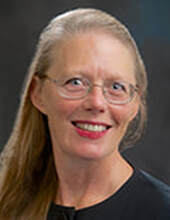
Greta Eleen Pennell
Scholarly Bio: Greta Eleen Pennell holds a Ph.D. and MS in Developmental and Social Psychology from Rutgers University, a MA in Educational Administration from the University of Massachusetts, a MS in Secondary Education from Indiana University, and a BS in Zoology from Iowa State University. A Professor Emeritus in the School of Education at the University of Indianapolis, her interdisciplinary research revolves around questions of gender, identity, lifespan development, and pedagogy. Applying her expertise in both qualitative and quantitative methods, she has served on the Council for the Accreditation of Educator Preparation (CAEP) and is currently Vice-President of the International Toy Research Association.
Reflexive Statement: As a first generation college student, academia was uncharted territory. My journey to becoming an academic was one of starts and stops with many twists and turns. Along the way I was very fortunate to encounter mentors who believed in me, helped me find my way, and who, by way of example, highlighted the power and possibilities of integrating scholarship, teaching, and service. I was first introduced to AHS in 1993 and was immediately taken by the supportive ethos of the conference, one that stood in sharp contrast to the “dog eat dog, one-upmanship” feel of other national conferences. Plus, here was a place where scholar-activism and trans-disciplinary work was truly valued. It was a community where understanding the humans and humanity of academic work was considered a strength rather than a threat to its validity. AHS has been my professional home ever since. Boyer (1990) wrote that, “the work of the scholar also means stepping back from one’s investigation, looking for connections, building bridges between theory and practice, and communicating one’s knowledge effectively” (p. 16). It is through that lens that I view my role as a colleague, researcher, and reviewer. My service on the editorial board reflects my commitment to teaching in pursuit of the dual goals of doing good research, and doing good through our research. The non-blind review process helps to remind us that the articles being considered, as well as the reviews themselves, are the work of human beings – actual people deserving of respectful and supportive feedback. I am committed to developing other publication practices that build up rather than tear down our colleagues; as well as forging connections across disciplinary boundaries. It is from this vantage point that I look forward to working with you and the rest of the Humanity & Society team.
Scholarly Bio: Greta Eleen Pennell holds a Ph.D. and MS in Developmental and Social Psychology from Rutgers University, a MA in Educational Administration from the University of Massachusetts, a MS in Secondary Education from Indiana University, and a BS in Zoology from Iowa State University. A Professor Emeritus in the School of Education at the University of Indianapolis, her interdisciplinary research revolves around questions of gender, identity, lifespan development, and pedagogy. Applying her expertise in both qualitative and quantitative methods, she has served on the Council for the Accreditation of Educator Preparation (CAEP) and is currently Vice-President of the International Toy Research Association.
Reflexive Statement: As a first generation college student, academia was uncharted territory. My journey to becoming an academic was one of starts and stops with many twists and turns. Along the way I was very fortunate to encounter mentors who believed in me, helped me find my way, and who, by way of example, highlighted the power and possibilities of integrating scholarship, teaching, and service. I was first introduced to AHS in 1993 and was immediately taken by the supportive ethos of the conference, one that stood in sharp contrast to the “dog eat dog, one-upmanship” feel of other national conferences. Plus, here was a place where scholar-activism and trans-disciplinary work was truly valued. It was a community where understanding the humans and humanity of academic work was considered a strength rather than a threat to its validity. AHS has been my professional home ever since. Boyer (1990) wrote that, “the work of the scholar also means stepping back from one’s investigation, looking for connections, building bridges between theory and practice, and communicating one’s knowledge effectively” (p. 16). It is through that lens that I view my role as a colleague, researcher, and reviewer. My service on the editorial board reflects my commitment to teaching in pursuit of the dual goals of doing good research, and doing good through our research. The non-blind review process helps to remind us that the articles being considered, as well as the reviews themselves, are the work of human beings – actual people deserving of respectful and supportive feedback. I am committed to developing other publication practices that build up rather than tear down our colleagues; as well as forging connections across disciplinary boundaries. It is from this vantage point that I look forward to working with you and the rest of the Humanity & Society team.
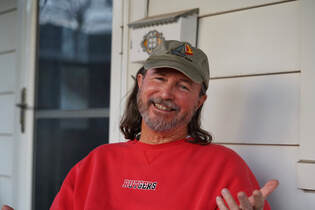
James Pennell
Scholarly Bio: I am toward the end of my career as a sociologist, currently professor emeritus from the University of Indianapolis, and am also a lifelong musician. I have undergraduate and graduate degrees in sociology as well as an undergraduate degree in secondary education (Social Studies). In addition to being a department chair for 13 years (minus some sabbaticals), I spent a number of years as co-director of the Community Research Center at the University of Indianapolis. In all my endeavors, I have worked to bridge my teaching, scholarship, and service with students, colleagues, and the communities of people where I live and work. My scholarship has been wide-ranging, but much of it has focused on work and organizations, including social movement organizations, and social change. Early in my career, I studied K-12 schools and progressive education movements. Later I studied the uses of songs in social movements, the growth of farmers markets, and the winery boom in the Midwest, as documented in my book Local Vino: The Winery Boom in the Heartland (Univ. of Illinois Press, 2017) that examines the development and growth of the winery industries in Ohio, Indiana, Illinois, and Iowa. My greatest honors have been receiving service awards from my university and AHS for work that was deeply meaningful and important to me. I owe much to teachers, colleagues, and students too numerous to mention who have made me a better sociologist and hopefully a better human than I might have been, although there is always room for improvement, so I’ll keep at it.
Reflexive Statement: My career as a sociologist has been focused on integrating what we as humans know with what we can do to make a better world. I believe we must be meaningfully engaged in that world and engage our students, colleagues, and community members to accomplish that. As academics, we must bridge our teaching, scholarship, and service, serving not only our students, universities, and disciplines, but our communities and the larger social world. I believe we can be actively engaged in change pursuits and also be reflexively critical about those efforts and our involvements. Our studies and methods provide us with vantage points from which to view and consider those efforts and modify or change course when the evidence warrants that.
Scholarly Bio: I am toward the end of my career as a sociologist, currently professor emeritus from the University of Indianapolis, and am also a lifelong musician. I have undergraduate and graduate degrees in sociology as well as an undergraduate degree in secondary education (Social Studies). In addition to being a department chair for 13 years (minus some sabbaticals), I spent a number of years as co-director of the Community Research Center at the University of Indianapolis. In all my endeavors, I have worked to bridge my teaching, scholarship, and service with students, colleagues, and the communities of people where I live and work. My scholarship has been wide-ranging, but much of it has focused on work and organizations, including social movement organizations, and social change. Early in my career, I studied K-12 schools and progressive education movements. Later I studied the uses of songs in social movements, the growth of farmers markets, and the winery boom in the Midwest, as documented in my book Local Vino: The Winery Boom in the Heartland (Univ. of Illinois Press, 2017) that examines the development and growth of the winery industries in Ohio, Indiana, Illinois, and Iowa. My greatest honors have been receiving service awards from my university and AHS for work that was deeply meaningful and important to me. I owe much to teachers, colleagues, and students too numerous to mention who have made me a better sociologist and hopefully a better human than I might have been, although there is always room for improvement, so I’ll keep at it.
Reflexive Statement: My career as a sociologist has been focused on integrating what we as humans know with what we can do to make a better world. I believe we must be meaningfully engaged in that world and engage our students, colleagues, and community members to accomplish that. As academics, we must bridge our teaching, scholarship, and service, serving not only our students, universities, and disciplines, but our communities and the larger social world. I believe we can be actively engaged in change pursuits and also be reflexively critical about those efforts and our involvements. Our studies and methods provide us with vantage points from which to view and consider those efforts and modify or change course when the evidence warrants that.
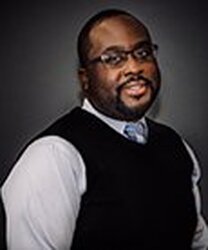
Watoii R. Rabii
Scholarly Bio: Watoii Rabii holds a Ph.D. in sociology from the University at Buffalo, SUNY, an MA in Sociology from University at Buffalo, SUNY, and a BA in Sociology from State University College at Buffalo. He is an assistant professor of Criminal Justice at Oakland University in Michigan. He studies race, immigration, and masculinities in rustbelt cities and the experiences of people and immigrants of color with the criminal justice system. His published works include “One of the Good Ones: Rhetorical Maneuvers of Whiteness” published in Critical Sociology and “No Tough Guys Here?” Hybrid Masculinity in a Boxing Gym” published in the Journal of Contemporary Ethnography. His coauthored publications include “Buffalo’s West Side Story: Migration, Gentrification, and Neighborhood Change” published in City and Community and “‘It’s Just Art’: Experiences of K-12 Visual Arts Teachers in the Era of Neoliberalism, Assessment, and Accountability” published in Sociation Today.
Reflexive Statement: My first Sociology and American History undergraduate courses left an enduring impact on me and helped me develop my sociological imagination. Throughout college and graduate school, I became interested in colorblind racisms and hybrid masculinities as they relate to the experiences of communities of color and immigrants with discriminatory criminal justice and immigration policies. I primarily explore this phenomenon in rustbelt cities. While pursuing this research agenda, I also participated in research on museum outreach to low-income communities. This research exposed some of the geographic and financial barriers parents face. My research agenda informs my teaching as my courses focus on race, criminological and sociological theory, criminal justice and immigration systems, and rustbelt cities. I use a historical approach that shows students how racial ideologies have transformed over time and continue to perpetuate racial inequality.
Scholarly Bio: Watoii Rabii holds a Ph.D. in sociology from the University at Buffalo, SUNY, an MA in Sociology from University at Buffalo, SUNY, and a BA in Sociology from State University College at Buffalo. He is an assistant professor of Criminal Justice at Oakland University in Michigan. He studies race, immigration, and masculinities in rustbelt cities and the experiences of people and immigrants of color with the criminal justice system. His published works include “One of the Good Ones: Rhetorical Maneuvers of Whiteness” published in Critical Sociology and “No Tough Guys Here?” Hybrid Masculinity in a Boxing Gym” published in the Journal of Contemporary Ethnography. His coauthored publications include “Buffalo’s West Side Story: Migration, Gentrification, and Neighborhood Change” published in City and Community and “‘It’s Just Art’: Experiences of K-12 Visual Arts Teachers in the Era of Neoliberalism, Assessment, and Accountability” published in Sociation Today.
Reflexive Statement: My first Sociology and American History undergraduate courses left an enduring impact on me and helped me develop my sociological imagination. Throughout college and graduate school, I became interested in colorblind racisms and hybrid masculinities as they relate to the experiences of communities of color and immigrants with discriminatory criminal justice and immigration policies. I primarily explore this phenomenon in rustbelt cities. While pursuing this research agenda, I also participated in research on museum outreach to low-income communities. This research exposed some of the geographic and financial barriers parents face. My research agenda informs my teaching as my courses focus on race, criminological and sociological theory, criminal justice and immigration systems, and rustbelt cities. I use a historical approach that shows students how racial ideologies have transformed over time and continue to perpetuate racial inequality.
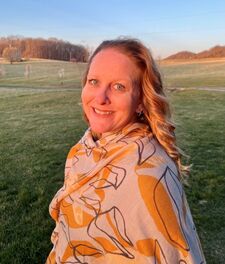
Courtney B. Ross
Scholarly Bio: Courtney B. Ross is a PhD candidate in Sociology at Virginia Tech and is anticipated to graduate in May 2023. She earned a MS in Sociology from Virginia Tech and a BA in Sociology/Anthropology from West Virginia University. Her dissertation research is an experimental design of the Soloman four-group that focuses on whether contemplative pedagogical practices can assist in developing the sociological imagination in students taking an introductory sociology course. Courtney’s teaching and research interests are peace studies and violence prevention, contemplative sociology, the sociology of gender and sexuality, and pedagogy and curriculum development. Her publications can be found in Teaching Sociology journal and TRAILS, the Teaching Resources and Innovations Library for Sociology.
Reflexive Statement: My education and employment within academia is a story of twists and turns. In this statement, this is the story of how I discovered my interests in humanist sociology. An experience of “sociological depression” led me to the field of peace studies. About seven years ago, I hit a wall with my teachings of sociology. I was no longer invigorated after classes, my passion about all thing’s sociology faded, and I questioned my career choice as well as the validation of the science of sociology. Finally, I came to realize that my lessons, while eye-opening to my students, lacked positivity. I seemed to be experiencing a depression brought upon by the negativity of what I was teaching in sociology courses. I also became cognizant of students expressing similar concerns. This is when I discovered the field of Peace Studies and Humanist Sociology. Bridging peace studies and humanist sociology resonated with me as an interdisciplinary way to solving the world’s atrocities of terrorism, climate collapse, inequalities, human rights violations, and social conflicts. And at the micro-level, I witnessed the great potential of inner peace building to manifest outward peace through the teaching of contemplative practices. The practices provided an explicit interpersonal component to the course. Contemplative pedagogy is now integral to my scholarship and teaching endeavors. I believe that modern education must see things holistically, integrating one’s imagination and self-realizations in an ever-growing process of self-transformation which concurrently contributes to a better world. For these reasons, I am excited for the opportunity to join the editorial team of Humanity and Society.
Scholarly Bio: Courtney B. Ross is a PhD candidate in Sociology at Virginia Tech and is anticipated to graduate in May 2023. She earned a MS in Sociology from Virginia Tech and a BA in Sociology/Anthropology from West Virginia University. Her dissertation research is an experimental design of the Soloman four-group that focuses on whether contemplative pedagogical practices can assist in developing the sociological imagination in students taking an introductory sociology course. Courtney’s teaching and research interests are peace studies and violence prevention, contemplative sociology, the sociology of gender and sexuality, and pedagogy and curriculum development. Her publications can be found in Teaching Sociology journal and TRAILS, the Teaching Resources and Innovations Library for Sociology.
Reflexive Statement: My education and employment within academia is a story of twists and turns. In this statement, this is the story of how I discovered my interests in humanist sociology. An experience of “sociological depression” led me to the field of peace studies. About seven years ago, I hit a wall with my teachings of sociology. I was no longer invigorated after classes, my passion about all thing’s sociology faded, and I questioned my career choice as well as the validation of the science of sociology. Finally, I came to realize that my lessons, while eye-opening to my students, lacked positivity. I seemed to be experiencing a depression brought upon by the negativity of what I was teaching in sociology courses. I also became cognizant of students expressing similar concerns. This is when I discovered the field of Peace Studies and Humanist Sociology. Bridging peace studies and humanist sociology resonated with me as an interdisciplinary way to solving the world’s atrocities of terrorism, climate collapse, inequalities, human rights violations, and social conflicts. And at the micro-level, I witnessed the great potential of inner peace building to manifest outward peace through the teaching of contemplative practices. The practices provided an explicit interpersonal component to the course. Contemplative pedagogy is now integral to my scholarship and teaching endeavors. I believe that modern education must see things holistically, integrating one’s imagination and self-realizations in an ever-growing process of self-transformation which concurrently contributes to a better world. For these reasons, I am excited for the opportunity to join the editorial team of Humanity and Society.
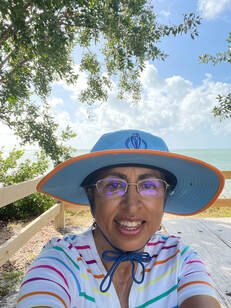
Joti Sekhon
Scholarly Bio: I am excited to continue serving on the Editorial Board for Humanity and Society. Having been an active member of AHS since 1988, I have served the association in numerous formal and informal capacities, including peer reviews, secretary, nominations committee and the book award committee. I bring with me several decades of life experiences, teaching and scholarship in India, North America and other parts of the world. Through this journey, I developed a passion to learn and share knowledge and perspectives from the world with students and others. I grew up in India, and received my undergraduate degree at Lady Sri Ram College in Delhi, followed by M.A. and M.Phil. degrees at Jawaharlal Nehru University. I then moved to Canada and obtained my Ph.D. from University of Waterloo in Ontario. Thereafter, in the US I served as professor of sociology, and director, International Studies Program, at Greensboro College. Following that I was at Winston-Salem State University for a decade, also as a professor of sociology and director of International Programs, before retiring in 2018. In addition to teaching and research, I led the development of international education programs mostly in Asia, Africa, and Latin America, and globalization of the curriculum for students and faculty. Post retirement, I have taught part time at Duke University, worked with local immigrant communities, and engaged with environmental issues. My scholarly interests center on comparative-historical sociology, cultural theory, ethnic relations, social inequalities, gender, and social movements, and the process of democratization. After my doctoral dissertation on a comparative and historical analysis of the relationship between nationalist movements and the global processes of democratization, I turned my attention to the potential of community-based grassroots social movements to contribute to democratization at the inter-personal, local, national, and international levels. Some of this work is included in the book that I co-edited with Jill Bystydzienski, Democratization and Women's Grassroots Movements. I wrote another book titled Modern India: A Volume in the Comparative Societies Series, part of a series designed to enhance globalization of undergraduate education in North America. In recent years, I have been researching the Indigenization and Globalization of the Game of Cricket, focusing on a comparative-historical analysis of the cultural and political significance and development of cricket in India and the West Indies within the context of colonialism, post-colonialism, and globalization. And yes, I have been a cricket fan since childhood! I now live in Chapel Hill with my husband, Alan. Our son, Imran, lives in New York. I enjoy nature, traveling, watching cricket, reading and good food.
Scholarly Bio: I am excited to continue serving on the Editorial Board for Humanity and Society. Having been an active member of AHS since 1988, I have served the association in numerous formal and informal capacities, including peer reviews, secretary, nominations committee and the book award committee. I bring with me several decades of life experiences, teaching and scholarship in India, North America and other parts of the world. Through this journey, I developed a passion to learn and share knowledge and perspectives from the world with students and others. I grew up in India, and received my undergraduate degree at Lady Sri Ram College in Delhi, followed by M.A. and M.Phil. degrees at Jawaharlal Nehru University. I then moved to Canada and obtained my Ph.D. from University of Waterloo in Ontario. Thereafter, in the US I served as professor of sociology, and director, International Studies Program, at Greensboro College. Following that I was at Winston-Salem State University for a decade, also as a professor of sociology and director of International Programs, before retiring in 2018. In addition to teaching and research, I led the development of international education programs mostly in Asia, Africa, and Latin America, and globalization of the curriculum for students and faculty. Post retirement, I have taught part time at Duke University, worked with local immigrant communities, and engaged with environmental issues. My scholarly interests center on comparative-historical sociology, cultural theory, ethnic relations, social inequalities, gender, and social movements, and the process of democratization. After my doctoral dissertation on a comparative and historical analysis of the relationship between nationalist movements and the global processes of democratization, I turned my attention to the potential of community-based grassroots social movements to contribute to democratization at the inter-personal, local, national, and international levels. Some of this work is included in the book that I co-edited with Jill Bystydzienski, Democratization and Women's Grassroots Movements. I wrote another book titled Modern India: A Volume in the Comparative Societies Series, part of a series designed to enhance globalization of undergraduate education in North America. In recent years, I have been researching the Indigenization and Globalization of the Game of Cricket, focusing on a comparative-historical analysis of the cultural and political significance and development of cricket in India and the West Indies within the context of colonialism, post-colonialism, and globalization. And yes, I have been a cricket fan since childhood! I now live in Chapel Hill with my husband, Alan. Our son, Imran, lives in New York. I enjoy nature, traveling, watching cricket, reading and good food.
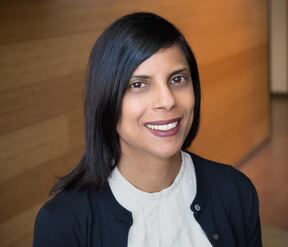
Saher Selod
Scholarly Bio: Saher Selod holds a PhD in Sociology from Loyola University Chicago, an MA in Sociology from Depaul University, and a BA in Sociology from the University of Texas at Austin. She is an Associate Professor and Chair of the Sociology Department at Simmons University. Her scholarship examines how Muslim Americans experience racialization in the United States and globally. She is the author of Forever Suspect: Racialized Surveillance of Muslim Americans in the War on Terror (Rutgers University Press 2018) and is currently co-authoring a book called Islamophobia: Twenty First Century Racism, which is under contract at Polity Press and due out in 2023.
.
Reflexive Statement: I am thrilled to serve on the editorial board for Humanity & Society. The values that this journal upholds align with my personal and professional values. I am constantly reminded that the reason I chose to pursue a PhD in academia was because of how isolated and marginalized I felt as one of the few students of color in my classrooms. I had few faculty of color to mentor me and in the majority of my classes I struggled to find the scholarship I read useful in explaining the experiences Muslims were having with racism. Charles Mills' opening sentences in The Racial Contract resonated with me. "White Supremacy is the unnamed political system that has made the modern world what it is today. You will not find this term in introductory, or even advanced, texts in political theory." I knew as a graduate student that Sociology needed more people of color to shift the academic terrain pedagogically and epistemologically to reflect the realities of communities that had been marginalized for too long. It is vital we have journals that truly make it their mission to decolonize our scholarship and to highlight the work of scholar activists.
Scholarly Bio: Saher Selod holds a PhD in Sociology from Loyola University Chicago, an MA in Sociology from Depaul University, and a BA in Sociology from the University of Texas at Austin. She is an Associate Professor and Chair of the Sociology Department at Simmons University. Her scholarship examines how Muslim Americans experience racialization in the United States and globally. She is the author of Forever Suspect: Racialized Surveillance of Muslim Americans in the War on Terror (Rutgers University Press 2018) and is currently co-authoring a book called Islamophobia: Twenty First Century Racism, which is under contract at Polity Press and due out in 2023.
.
Reflexive Statement: I am thrilled to serve on the editorial board for Humanity & Society. The values that this journal upholds align with my personal and professional values. I am constantly reminded that the reason I chose to pursue a PhD in academia was because of how isolated and marginalized I felt as one of the few students of color in my classrooms. I had few faculty of color to mentor me and in the majority of my classes I struggled to find the scholarship I read useful in explaining the experiences Muslims were having with racism. Charles Mills' opening sentences in The Racial Contract resonated with me. "White Supremacy is the unnamed political system that has made the modern world what it is today. You will not find this term in introductory, or even advanced, texts in political theory." I knew as a graduate student that Sociology needed more people of color to shift the academic terrain pedagogically and epistemologically to reflect the realities of communities that had been marginalized for too long. It is vital we have journals that truly make it their mission to decolonize our scholarship and to highlight the work of scholar activists.
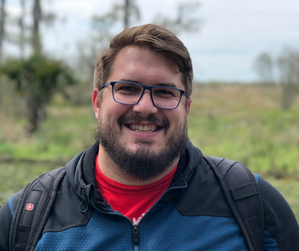
Marc R. Settembrino
Scholarly Bio: Marc Settembrino (he/they) is an Associate Professor of Sociology at Southeastern Louisiana University. Marc earned a Ph.D. in Sociology at the University of Central Florida and hold's bachelor's and master's degrees in Sociology from the University of South Florida. Marc's research interests are varied and include social vulnerability and disasters, fat studies, and the sociology of yoga.
Reflexive Statement: White Supremacy, Cis-Hetero-Patriarchy, Ableism, Anti-Fatness, and Capitalism actively repress our humanity. As a result, many of us accept that we are unworthy of dignity. Worse yet, we allow other people to suffer because we don’t recognize them as humans either. I spent most of my fat-queer life thinking that I was unworthy of love, acceptance, or kindness. I believed that I needed to shrink myself before I could be worthy. I lived disembodied, for a future thinner self. One day I could be happy, but not until I took up less space. My yoga practice has transformed my relations to my body, mind, and spirit and much of my work is inform by these transformations. As an a researcher, educator, and yoga practitioner, my goal is to hold space for people to reconnect with their humanity and to recognize our shared humanity in one another. Your value as human beings is not tied to our ability to do a handstand (or any other arbitrary standard). You are worthy of dignity, love, acceptance, and respect simply for being alive. I believe that together, we can build a society that promotes dignity and honors our shared humanity.
Instagram: @fatkidyogaclub
Scholarly Bio: Marc Settembrino (he/they) is an Associate Professor of Sociology at Southeastern Louisiana University. Marc earned a Ph.D. in Sociology at the University of Central Florida and hold's bachelor's and master's degrees in Sociology from the University of South Florida. Marc's research interests are varied and include social vulnerability and disasters, fat studies, and the sociology of yoga.
Reflexive Statement: White Supremacy, Cis-Hetero-Patriarchy, Ableism, Anti-Fatness, and Capitalism actively repress our humanity. As a result, many of us accept that we are unworthy of dignity. Worse yet, we allow other people to suffer because we don’t recognize them as humans either. I spent most of my fat-queer life thinking that I was unworthy of love, acceptance, or kindness. I believed that I needed to shrink myself before I could be worthy. I lived disembodied, for a future thinner self. One day I could be happy, but not until I took up less space. My yoga practice has transformed my relations to my body, mind, and spirit and much of my work is inform by these transformations. As an a researcher, educator, and yoga practitioner, my goal is to hold space for people to reconnect with their humanity and to recognize our shared humanity in one another. Your value as human beings is not tied to our ability to do a handstand (or any other arbitrary standard). You are worthy of dignity, love, acceptance, and respect simply for being alive. I believe that together, we can build a society that promotes dignity and honors our shared humanity.
Instagram: @fatkidyogaclub
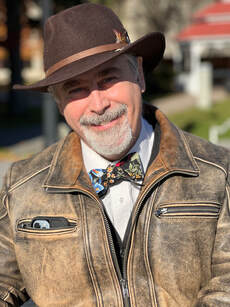
Thomas Piñeros Shields
Scholarly Bio: Thomas Piñeros Shields, Ph.D., educates students to respond to public problems including racism, sexual violence, global migration, the climate crisis and social equity through courses such as social problems, social policy and inequalities, and sociology of immigration. He also teaches the capstone internship program and leads the Capstone Experience for MPA students. In addition, Piñeros Shields is the founding graduate coordinator of the Master of Public Administration (MPA) program as well as the concentration in Human Service Management and the Public Administration and Leadership Certificate. He brings over thirty years of work in areas related to experiential education, participatory action research and civic engagement, with an emphasis on the experiences of youth and global migration. Piñeros Shields’ dissertation was a five-year in-depth ethnography of undocumented immigrant students in the Student Immigrant Movement (SIM) in Massachusetts, a key player in the national DREAM Movement. Most of his scholarship has been applied research and program evaluations been for policy makers and non-profit organizations or foundations at the international, national, state and local levels. These have included projects for the Chan Zuckerberg Initiative, City of New Bedford, Massachusetts Immigrant and Refugee Advocacy Coalition, the YMCA of the USA, Junior Achievement Worldwide, Massachusetts Department of Education, US Bureau of Justice Assistance, and the Corporation for National and Community Service. As part of this work he has conducted multi-site, mixed-methods evaluations of programs to develop youth civic education, college access, entrepreneurship skills, and STEM capacities.He has vast experience as part of research teams where he has designed, conducted and analyzed surveys, held individual and group interviews, written case studies, and completed multivariate and logistics analyses of large data sets. Piñeros Shields has also developed community based and participatory action research projects with youth and adults from urban communities.
Reflexive Statement: My name is Thomas Piñeros Shields. My preferred pronouns are he, him and his. I am an Associate Teaching Professor in the Department of Sociology, UMASS Lowell. I grew up in a close extended family, with grandparents across the street and relatives around the block, in my working-class neighborhood on Long Island, NY. Upon graduating from high school, I became the first in my family to attend a four-year college, when I enrolled in Cornell University. This elite ivy league university felt magical. Each day I crossed over waterfalls on my way to class or watched sunsets from a hilltop. I made friends, was active in my residence hall leadership and became varsity cheerleader. In and out of class, I was exposed to new ideas, especially something called self-directed experiential learning, inspired by the works of John Dewey, Paulo Freire and bell hooks, that put me in control of my own learning. I also engaged in my first community-based research projects, first with Southeast Asian Refugees in Ithaca, and then with substance abuse programs in Queens, NY. In my third year of college, my parents could no longer pay for my college. I began to understand some things about my position in the world. First, I came to understand how accumulated wealth, not just income, matters if you want to attain social mobility. And wealth takes time…generations even. Second, I came to understand that for many first-generation students, there is a great deal that we don’t know about navigating the college system. In my case, my parents had never even applied for financial aid. We believed in the American middle-class myth that government help is only for the very poor, not middle-class families. So, during my second semester of my junior year I received a small grant, applied for my first of several college loans, and took several work study jobs. As a result, I was able to go back to college, but more importantly this experience (and others) shaped my understanding of myself in the world. At that point, I made a choice. I could continue to believe that problems that I faced were the result of failures of me or my parents – or I could recognize that the costs of college were rising at historical rates, and that we faced structural condition that shaped my life and lives of millions of others. So I chose to fight. When I returned to campus that spring, I joined a classmate to co-found an organization to advocate for reduced college tuition rates. These were my experiences of college, and after a very long journey, I eventually became a sociologist and experiential educator. In many ways, I have tried to support young people to find the power within them to change the worked, and to engage in both international and intercultural experiences to understand one another better. I have worked at an international service-learning program, led teams of New York City Black and Latinx young adults as part of community service project teams, helped build urban housing and create economic opportunities in East St. Louis, IL, and later conducted program evaluation for non-profits, foundations and government agencies at local, state, national and international levels. Along the way, I completed a Master’s degree at Tufts University and my joint-doctoral degree in Social Policy and Sociology at Brandeis University, while working full-time, and where I met my wife and our two sons. We now have a daughter and have built our life around the principles of social justice.
Scholarly Bio: Thomas Piñeros Shields, Ph.D., educates students to respond to public problems including racism, sexual violence, global migration, the climate crisis and social equity through courses such as social problems, social policy and inequalities, and sociology of immigration. He also teaches the capstone internship program and leads the Capstone Experience for MPA students. In addition, Piñeros Shields is the founding graduate coordinator of the Master of Public Administration (MPA) program as well as the concentration in Human Service Management and the Public Administration and Leadership Certificate. He brings over thirty years of work in areas related to experiential education, participatory action research and civic engagement, with an emphasis on the experiences of youth and global migration. Piñeros Shields’ dissertation was a five-year in-depth ethnography of undocumented immigrant students in the Student Immigrant Movement (SIM) in Massachusetts, a key player in the national DREAM Movement. Most of his scholarship has been applied research and program evaluations been for policy makers and non-profit organizations or foundations at the international, national, state and local levels. These have included projects for the Chan Zuckerberg Initiative, City of New Bedford, Massachusetts Immigrant and Refugee Advocacy Coalition, the YMCA of the USA, Junior Achievement Worldwide, Massachusetts Department of Education, US Bureau of Justice Assistance, and the Corporation for National and Community Service. As part of this work he has conducted multi-site, mixed-methods evaluations of programs to develop youth civic education, college access, entrepreneurship skills, and STEM capacities.He has vast experience as part of research teams where he has designed, conducted and analyzed surveys, held individual and group interviews, written case studies, and completed multivariate and logistics analyses of large data sets. Piñeros Shields has also developed community based and participatory action research projects with youth and adults from urban communities.
Reflexive Statement: My name is Thomas Piñeros Shields. My preferred pronouns are he, him and his. I am an Associate Teaching Professor in the Department of Sociology, UMASS Lowell. I grew up in a close extended family, with grandparents across the street and relatives around the block, in my working-class neighborhood on Long Island, NY. Upon graduating from high school, I became the first in my family to attend a four-year college, when I enrolled in Cornell University. This elite ivy league university felt magical. Each day I crossed over waterfalls on my way to class or watched sunsets from a hilltop. I made friends, was active in my residence hall leadership and became varsity cheerleader. In and out of class, I was exposed to new ideas, especially something called self-directed experiential learning, inspired by the works of John Dewey, Paulo Freire and bell hooks, that put me in control of my own learning. I also engaged in my first community-based research projects, first with Southeast Asian Refugees in Ithaca, and then with substance abuse programs in Queens, NY. In my third year of college, my parents could no longer pay for my college. I began to understand some things about my position in the world. First, I came to understand how accumulated wealth, not just income, matters if you want to attain social mobility. And wealth takes time…generations even. Second, I came to understand that for many first-generation students, there is a great deal that we don’t know about navigating the college system. In my case, my parents had never even applied for financial aid. We believed in the American middle-class myth that government help is only for the very poor, not middle-class families. So, during my second semester of my junior year I received a small grant, applied for my first of several college loans, and took several work study jobs. As a result, I was able to go back to college, but more importantly this experience (and others) shaped my understanding of myself in the world. At that point, I made a choice. I could continue to believe that problems that I faced were the result of failures of me or my parents – or I could recognize that the costs of college were rising at historical rates, and that we faced structural condition that shaped my life and lives of millions of others. So I chose to fight. When I returned to campus that spring, I joined a classmate to co-found an organization to advocate for reduced college tuition rates. These were my experiences of college, and after a very long journey, I eventually became a sociologist and experiential educator. In many ways, I have tried to support young people to find the power within them to change the worked, and to engage in both international and intercultural experiences to understand one another better. I have worked at an international service-learning program, led teams of New York City Black and Latinx young adults as part of community service project teams, helped build urban housing and create economic opportunities in East St. Louis, IL, and later conducted program evaluation for non-profits, foundations and government agencies at local, state, national and international levels. Along the way, I completed a Master’s degree at Tufts University and my joint-doctoral degree in Social Policy and Sociology at Brandeis University, while working full-time, and where I met my wife and our two sons. We now have a daughter and have built our life around the principles of social justice.
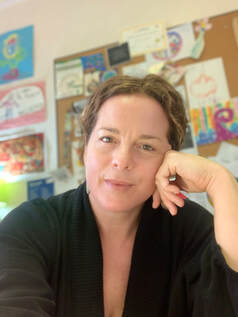
Katerina Standish
Scholarly Bio: Dr. Katerina Standish is a Senior Lecturer at the National Centre for Peace and Conflict Studies at the University of Otago, Aotearoa/New Zealand. Her previous publications include content related to genocide, femicide, suicide, COVID-19, Peace Education, Encounter Theory, cultural violence, gender, conflict narratives, personal peacebuilding, and sacred space. Dr. Standish is the Editor-in-Chief of the Peace Review: a Journal of Social Justice and senior editor of the Palgrave Handbook of Positive Peace. Dr. Standish holds a Ph.D. in Peace and Conflict Studies from the Mauro Insitute for Peace and Justice at the University of Manitoba, a master's degree in Human Security and Peacebuilding from Royal Roads University, and a post-baccalaureate in Communications and an undergraduate degree in Anthropology and Humanities from Simon Fraser University. Dr. Standish is an interdisciplinary social scientist and a critical peace pedagogue committed to understanding and combating violence in the self and society. She is a university and community educator, Certified Conflict Coach (CCI), Somatic Trainer (MY), and trauma-informed instructor (TT).
Reflexive Statement: I consider service the guiding value of my work and integrate my care ethos via awareness-raising, emotional regulation, and conflict resilience building. I also frequently utter 'write as if your life depends upon it.'
Scholarly Bio: Dr. Katerina Standish is a Senior Lecturer at the National Centre for Peace and Conflict Studies at the University of Otago, Aotearoa/New Zealand. Her previous publications include content related to genocide, femicide, suicide, COVID-19, Peace Education, Encounter Theory, cultural violence, gender, conflict narratives, personal peacebuilding, and sacred space. Dr. Standish is the Editor-in-Chief of the Peace Review: a Journal of Social Justice and senior editor of the Palgrave Handbook of Positive Peace. Dr. Standish holds a Ph.D. in Peace and Conflict Studies from the Mauro Insitute for Peace and Justice at the University of Manitoba, a master's degree in Human Security and Peacebuilding from Royal Roads University, and a post-baccalaureate in Communications and an undergraduate degree in Anthropology and Humanities from Simon Fraser University. Dr. Standish is an interdisciplinary social scientist and a critical peace pedagogue committed to understanding and combating violence in the self and society. She is a university and community educator, Certified Conflict Coach (CCI), Somatic Trainer (MY), and trauma-informed instructor (TT).
Reflexive Statement: I consider service the guiding value of my work and integrate my care ethos via awareness-raising, emotional regulation, and conflict resilience building. I also frequently utter 'write as if your life depends upon it.'
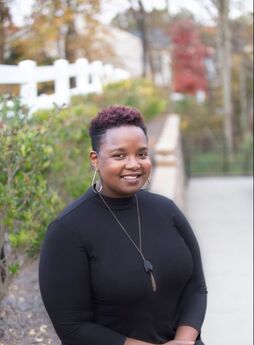
Ebonie Cunningham Stringer
Scholarly Bio: Ebonie Cunningham Stringer holds a B.A. in Political Science, Sociology and Black Studies from the University of Missouri-Columbia, and a PhD in Sociology from Purdue University in West Lafayette, Indiana. Her degree concentrations include Law & Society, Criminal Justice, and the Family. Whether in the classroom, in the community or in a conference hall, Dr. Stringer is motivated by her passion for social justice and social change. She is a Criminal Justice faculty member at Penn State Berks.
Reflexive Statement: As a young child I was always attentive to issues of justice, though I was not able to name my concerns then. In the schoolyard and at home I could be found resisting unjust policies such as the rule against magic markers at home (because we children tended to make the walls our canvas). In the name of all that was creative and beautiful, I resisted. On the playground I gravitated toward children who were excluded and insisted that everyone be included. We all deserve a turn at kickball, double-dutch and four-square. As the daughter of a deacon and a former pastor, I was raised in the environs of Black Church and bathed in its culture. However, I remained in proximity to many whose lives were forever changed by various injustices and the criminal-legal system.
As a sociologist, I have committed my personal and scholarly pursuits to research, teaching and service at the intersections of the criminal-legal system, family, religion and other social institutions. My mission is to lift and center voices that are yet unheard or (mis)understood, and to produce scholarship that can lead to meaningful policy changes and a more just society.
Scholarly Bio: Ebonie Cunningham Stringer holds a B.A. in Political Science, Sociology and Black Studies from the University of Missouri-Columbia, and a PhD in Sociology from Purdue University in West Lafayette, Indiana. Her degree concentrations include Law & Society, Criminal Justice, and the Family. Whether in the classroom, in the community or in a conference hall, Dr. Stringer is motivated by her passion for social justice and social change. She is a Criminal Justice faculty member at Penn State Berks.
Reflexive Statement: As a young child I was always attentive to issues of justice, though I was not able to name my concerns then. In the schoolyard and at home I could be found resisting unjust policies such as the rule against magic markers at home (because we children tended to make the walls our canvas). In the name of all that was creative and beautiful, I resisted. On the playground I gravitated toward children who were excluded and insisted that everyone be included. We all deserve a turn at kickball, double-dutch and four-square. As the daughter of a deacon and a former pastor, I was raised in the environs of Black Church and bathed in its culture. However, I remained in proximity to many whose lives were forever changed by various injustices and the criminal-legal system.
As a sociologist, I have committed my personal and scholarly pursuits to research, teaching and service at the intersections of the criminal-legal system, family, religion and other social institutions. My mission is to lift and center voices that are yet unheard or (mis)understood, and to produce scholarship that can lead to meaningful policy changes and a more just society.
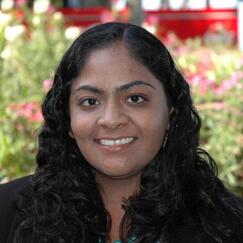
Bhoomi K. Thakore
Scholarly Bio: Bhoomi K. Thakore (she/her) is Assistant Professor in the Department of Sociology at the University of Connecticut. Her research interests include inequalities, intersectionality, media, and pedagogy.
Reflexive Statement: My roots in humanist sociology come from my research interests in social inequalities and social solutions. In order to understand the best laid plans for society, humanity must be at the center of the conversation. I am happy to share that perspective, and usher in critical scholarship, that does this work effectively.
Scholarly Bio: Bhoomi K. Thakore (she/her) is Assistant Professor in the Department of Sociology at the University of Connecticut. Her research interests include inequalities, intersectionality, media, and pedagogy.
Reflexive Statement: My roots in humanist sociology come from my research interests in social inequalities and social solutions. In order to understand the best laid plans for society, humanity must be at the center of the conversation. I am happy to share that perspective, and usher in critical scholarship, that does this work effectively.
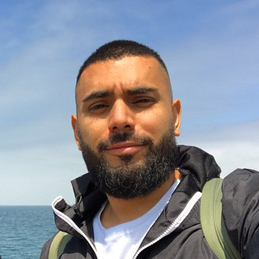
Mo Torres
Scholarly Bio: Mo Torres is a PhD candidate in sociology at Harvard University and a doctoral fellow in the Multidisciplinary Program in Inequality and Social Policy at the Harvard Kennedy School. He is interested in questions of political economy, race and class inequality, urban politics, and the history of social science. His dissertation investigates the politics of urban austerity in Michigan from the 1970s to the present. Other projects include research on fringe banking, place and policing, and the sociology of race and racism. Mo is originally from Sacramento and studied history and Chicana/o Studies at the University of California, Davis, and public policy at the University of Michigan. He is a former middle and high school teacher and in 2019 was a Fulbright scholar at the Universidade de São Paulo in Brazil.
Reflexive Statement: June Jordan said that “whatever chance I have to talk with people in large groups, I should really try to express something that has a kind of life and death implication. So, whether that is about South Africa or lunches for school children… I don’t see where I can afford to be what I call trivial because these are not trivial times it seems to me” (Brockport Writers Forum, September 1981). The greatest privilege the academic has is the ability to generate archives. The journals we publish in will be preserved for generations to come. How do we bear witness to the most urgent questions of our time? How do we communicate to readers a hundred years from now that there were critical voices at every step decrying the unjust status quo and imagining a brighter future? Like Beyoncé sings, “I was here.” What stories do we share with those who come after us?
Scholarly Bio: Mo Torres is a PhD candidate in sociology at Harvard University and a doctoral fellow in the Multidisciplinary Program in Inequality and Social Policy at the Harvard Kennedy School. He is interested in questions of political economy, race and class inequality, urban politics, and the history of social science. His dissertation investigates the politics of urban austerity in Michigan from the 1970s to the present. Other projects include research on fringe banking, place and policing, and the sociology of race and racism. Mo is originally from Sacramento and studied history and Chicana/o Studies at the University of California, Davis, and public policy at the University of Michigan. He is a former middle and high school teacher and in 2019 was a Fulbright scholar at the Universidade de São Paulo in Brazil.
Reflexive Statement: June Jordan said that “whatever chance I have to talk with people in large groups, I should really try to express something that has a kind of life and death implication. So, whether that is about South Africa or lunches for school children… I don’t see where I can afford to be what I call trivial because these are not trivial times it seems to me” (Brockport Writers Forum, September 1981). The greatest privilege the academic has is the ability to generate archives. The journals we publish in will be preserved for generations to come. How do we bear witness to the most urgent questions of our time? How do we communicate to readers a hundred years from now that there were critical voices at every step decrying the unjust status quo and imagining a brighter future? Like Beyoncé sings, “I was here.” What stories do we share with those who come after us?
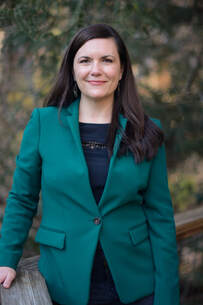
Megan R. Underhill
Scholarly Bio: Megan R. Underhill graduated with a Ph.D. in sociology from the University of Cincinnati. Since then, she's called the sociology and anthropology department at the University of North Carolina Asheville home. At UNCA, Megan teaches courses on race and racism, social inequality, urban studies, and social and cultural theory. Megan's research examines how white parents make sense of issues of racial and class inequality, and how they communicate these ideas to their children. Her scholarship has appeared in numerous peer-reviewed, academic journals and has also been featured in public outlets such as The Washington Post.
Reflexive Statement: One of the most frequent things I tell my students is that "research is a form of activism." Research allows us to uncover pernicious social ills and to identify potential solutions to our most pressing problems. Stated differently, I believe research is a form of praxis that allows us to imagine, and advocate for a more equitable world. As a member of Humanity and Society's Editorial Board, I look forward to publishing and promoting the work of other scholar-activists who believe their role is not simply to study the social world, but in the words of Marx, to change it.
Scholarly Bio: Megan R. Underhill graduated with a Ph.D. in sociology from the University of Cincinnati. Since then, she's called the sociology and anthropology department at the University of North Carolina Asheville home. At UNCA, Megan teaches courses on race and racism, social inequality, urban studies, and social and cultural theory. Megan's research examines how white parents make sense of issues of racial and class inequality, and how they communicate these ideas to their children. Her scholarship has appeared in numerous peer-reviewed, academic journals and has also been featured in public outlets such as The Washington Post.
Reflexive Statement: One of the most frequent things I tell my students is that "research is a form of activism." Research allows us to uncover pernicious social ills and to identify potential solutions to our most pressing problems. Stated differently, I believe research is a form of praxis that allows us to imagine, and advocate for a more equitable world. As a member of Humanity and Society's Editorial Board, I look forward to publishing and promoting the work of other scholar-activists who believe their role is not simply to study the social world, but in the words of Marx, to change it.
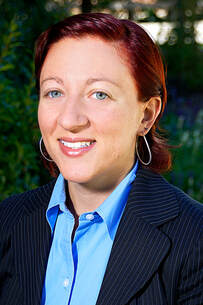
Melissa F. Weiner
Scholarly Bio: Melissa F. Weiner holds a Ph.D. in sociology from the University of Minnesota and a BA in sociology and BS in journalism from Boston University. An associate professor of sociology at the College of the Holy Cross in Worcester, MA, she has been affiliated with the European Research Centre on Migration and Ethnic Relations (Ercomer) at Utrecht University and the National Institute for the Study of Dutch Slavery and its Legacy (NiNsee) in Amsterdam. Her work, rooted in critical race and decolonial scholarship, identifies and theorizes white supremacist mechanisms of racism and colonialism in the US and internationally. She is the author of Power, Protest, and the Public Schools: Jewish and African American Protest in New York City and the co-editor of Smash the Pillars: Decoloniality and the Imaginary of Color in the Dutch Kingdom.
Reflexive Statement: Humanist Sociology, at its best, engages deeply with questions of social inequality for the purposes of justice. I am excited to be on the editorial board of a journal that practices this exciting aspect of sociology. H&S’s transparent review processes, interdisciplinarity, and attention to scholarship from groups often marginalized within both the social world at large and within academia, particularly those from underrepresented and oppressed groups in the US and the world, offer exciting opportunities to promote publication of findings relevant for the humanist sociology mission.
Scholarly Bio: Melissa F. Weiner holds a Ph.D. in sociology from the University of Minnesota and a BA in sociology and BS in journalism from Boston University. An associate professor of sociology at the College of the Holy Cross in Worcester, MA, she has been affiliated with the European Research Centre on Migration and Ethnic Relations (Ercomer) at Utrecht University and the National Institute for the Study of Dutch Slavery and its Legacy (NiNsee) in Amsterdam. Her work, rooted in critical race and decolonial scholarship, identifies and theorizes white supremacist mechanisms of racism and colonialism in the US and internationally. She is the author of Power, Protest, and the Public Schools: Jewish and African American Protest in New York City and the co-editor of Smash the Pillars: Decoloniality and the Imaginary of Color in the Dutch Kingdom.
Reflexive Statement: Humanist Sociology, at its best, engages deeply with questions of social inequality for the purposes of justice. I am excited to be on the editorial board of a journal that practices this exciting aspect of sociology. H&S’s transparent review processes, interdisciplinarity, and attention to scholarship from groups often marginalized within both the social world at large and within academia, particularly those from underrepresented and oppressed groups in the US and the world, offer exciting opportunities to promote publication of findings relevant for the humanist sociology mission.
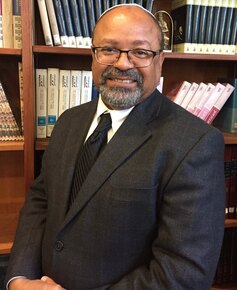
Johnny E. Williams
Scholarly Bio: Johnny E. Williams (B.A., Political Science and Sociology, Ouachita Baptist University 1984; M.A., University of Arkansas 1986; M.A., Brandeis University 1990; PhD., Brandeis University 1995) is Professor of Sociology at Trinity College in Hartford, Connecticut. He specializes in social movements, political sociology, cultural sociology, sociology of science, sociology of racial oppression, and sociology of religion. Professor Williams’s primary area of research investigates how culture (i.e., shared beliefs, values and meaning systems) sustains and challenges social order. He is the author of two books: African American Religion and the Civil Rights Movement in Arkansas (University of Mississippi Press 2003) and Decoding Racial Ideology in Genomics (Lexington Books 2016). He has also authored numerous book chapters, journal articles, editorials in his fields of expertise. Williams is currently writing two book manuscripts The Persistence of White Sociology (Palgrave MacMillan) and White Public Sociology Does Not Equal Organic Sociology: False Claims, White Supremacy, and Misplaced Diversity (Bristol University Press).
Reflexive Statement: My long-term agenda eliminate the systemic oppressions that people experience worldwide. My mission is intimately intertwined with what I do as as sociologist and global citizen. My driving belief is that colleges and universities much promote service to humanity not to self. For me, my involvement in the professoriate more than about helping students secure a diploma; it’s about equipping them with the critical and radical skills to advance our community, nation, and the world. This means that my teaching and research must be sufficiently complex and rich enough to enable students to acquire the ability to assess critically the ways people exist in the world.
Scholarly Bio: Johnny E. Williams (B.A., Political Science and Sociology, Ouachita Baptist University 1984; M.A., University of Arkansas 1986; M.A., Brandeis University 1990; PhD., Brandeis University 1995) is Professor of Sociology at Trinity College in Hartford, Connecticut. He specializes in social movements, political sociology, cultural sociology, sociology of science, sociology of racial oppression, and sociology of religion. Professor Williams’s primary area of research investigates how culture (i.e., shared beliefs, values and meaning systems) sustains and challenges social order. He is the author of two books: African American Religion and the Civil Rights Movement in Arkansas (University of Mississippi Press 2003) and Decoding Racial Ideology in Genomics (Lexington Books 2016). He has also authored numerous book chapters, journal articles, editorials in his fields of expertise. Williams is currently writing two book manuscripts The Persistence of White Sociology (Palgrave MacMillan) and White Public Sociology Does Not Equal Organic Sociology: False Claims, White Supremacy, and Misplaced Diversity (Bristol University Press).
Reflexive Statement: My long-term agenda eliminate the systemic oppressions that people experience worldwide. My mission is intimately intertwined with what I do as as sociologist and global citizen. My driving belief is that colleges and universities much promote service to humanity not to self. For me, my involvement in the professoriate more than about helping students secure a diploma; it’s about equipping them with the critical and radical skills to advance our community, nation, and the world. This means that my teaching and research must be sufficiently complex and rich enough to enable students to acquire the ability to assess critically the ways people exist in the world.
